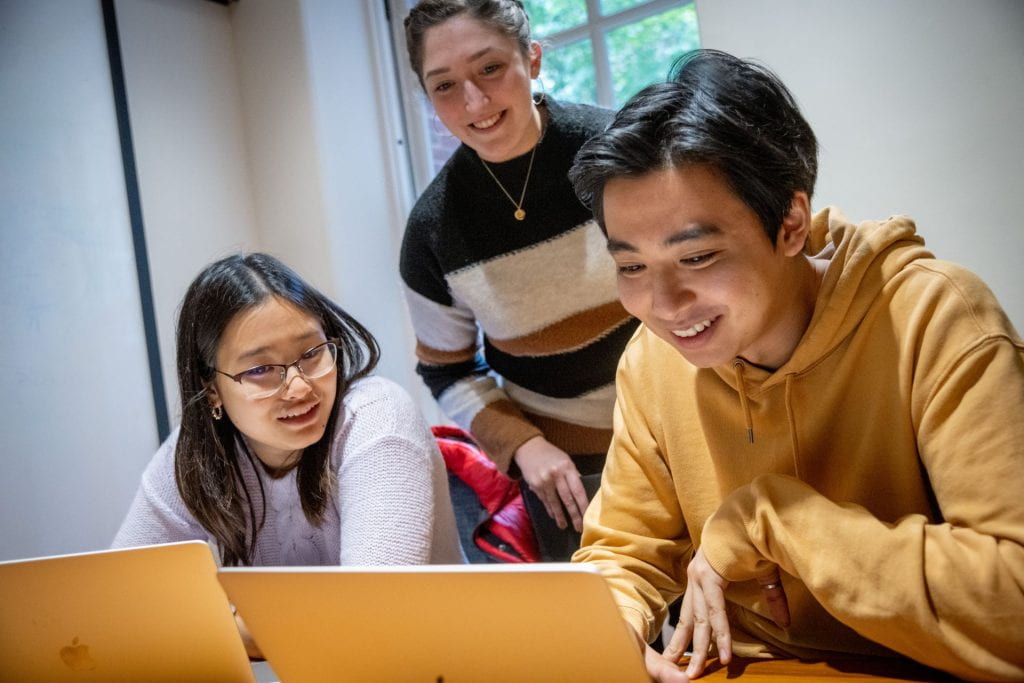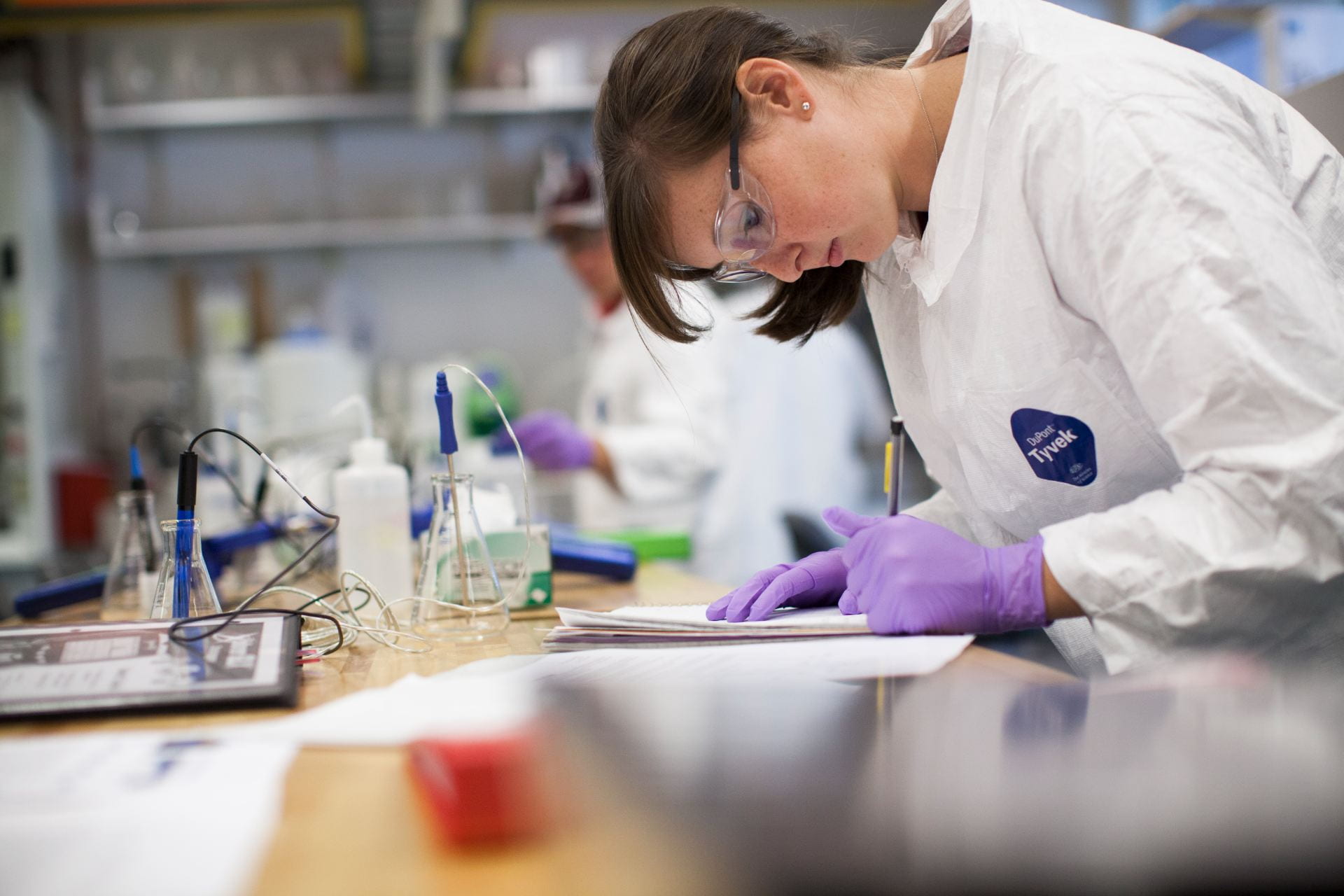Harvard College offers more than 3,700 courses in 50 undergraduate fields of study, which we call concentrations. In addition to a concentration, you may complete one of 49 secondary fields. While many fields are connected to an existing concentration, some are multi-disciplinary and are not directly affiliated with an existing concentration. Below, we have compiled short overviews of each to help you explore your academic interests. You can find comprehensive descriptions of each concentration and secondary, and their requirements, in the College’s Fields of Concentration book.
Class of 2028
The concentration declaration deadline is Friday, October 10. Check out our Guide to Pre-Declaration Processes to ensure you complete all the necessary steps to declare your concentration on time. Then, follow these steps to declare your concentration in my.harvard by the declaration deadline.

Field Clusters
We have categorized the concentrations and secondaries into nine field clusters, so that you can explore the intersections of the subject matter in a more dynamic and relatable way. Stand-alone secondaries are indicated by a double asterisk (**). Explore the learning opportunities each concentration and secondary offers by clicking the links below.
Arts
Art, Film, and Visual Studies

Brief Description
The concentration in Art, Film, and Visual Studies enables students to develop skills in the practice and the critical study of the visual arts. It includes photography, filmmaking, animation, video art, painting, drawing, printmaking and sculpture, as well as film and visual studies, critical theory, and the study of the built environment. The department has a strong commitment to fostering dialogue among makers, critics, and theorists
Learning Objectives
In Studio Art and Film/Video Production, concentrators work toward developing confidence and fluency in a chosen area of artistic production while also exploring a variety of other practices. In Film and Visual Studies, concentrators pursue interdisciplinary approaches to the theory and history of images, space, art, and media. In all areas, AFVS concentrators work closely with faculty, mostly in studios and small seminars, to gain understanding through both study and practice.
Before declaring AFVS, prospective concentrators need to have taken, or be in the process of taking one AFVS course, so taking a course as a first-year is highly recommended.
Gateway Courses
- First-Year Seminar 33O: Animation—Getting your Hands on Time
- First Year Seminar 63W: Vegetal Humanities—Paying Attention to Plants in Contemporary Art and Culture
- General Education 1114: Painting’s Doubt
- AFVS 11G: Exploring the Human Form: An Introduction to Figure Drawing
- AFVS 13: ASCO – Drawing as Intervention
- AFVS 15AR: Silkscreen
- AFVS 40S: Introduction to Photography
- AFVS 41: Introduction to Still Photography
- AFVS 42L: Introduction to Photography – Looking In, Looking Out
- AFVS 52: Introduction to Nonfiction Videomaking
- AFVS 53AR: Fundamentals of Animation
- AFVS 60X: Approaching Narrative: Introduction to Fiction Filmmaking
- AFVS 63: Introduction to Time Based Media
- AFVS 66: Building the Real—Non Fiction Essentials
- AFVS 70: The Art of Film
Introductory courses in photography, filmmaking, animation, video art, painting, drawing, printmaking, sculpture and film and visual studies are typically numbered in double digits, but triple digit courses can also admit first year students. Students are urged to check the course web site for information about enrolling in those courses.
Concentration Advising Contacts
Paula Soares (Study abroad contact)
Manager of Academic Programs, Advisor, Secondary Field Contact
soares@fas.harvard.edu
617-496-4469
English
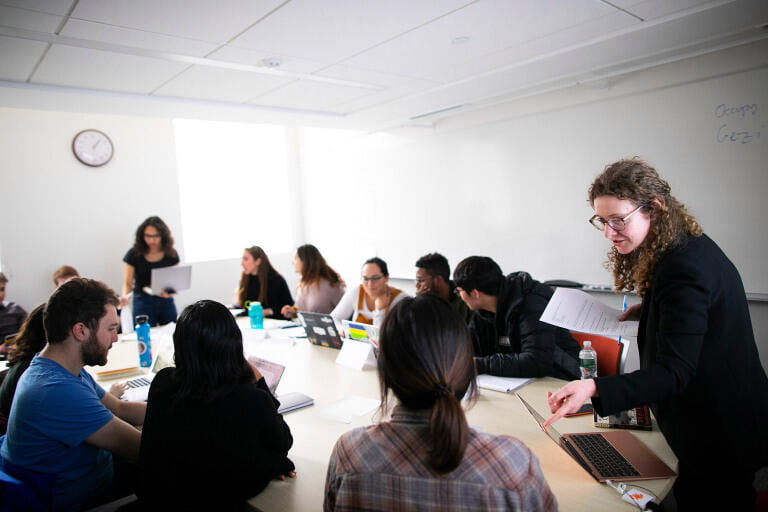
Brief Description
Humans use stories to cope and thrive, from oral poetic traditions to novels, screenplays, and hip hop rhymes. The English Department hones your expertise as a maker and interpreter of stories. By studying English literature, you will learn how to analyze and appreciate the language of the past and to craft new narratives for the future. You will develop expertise in communicating meaningfully through language and in interpreting others’ rhetoric, skills more crucial than ever in our text-saturated world. Along the way, you will both devise and encounter dazzling imaginary worlds that bring readers and writers together across vast expanses of space and time.
We commit ourselves to helping students immerse themselves in the literary worlds they know and love, discover new worlds they might not think to explore, acquire the means to write and read according to their own developing tastes, and sustain themselves on their intellectual and creative journeys.
Learning Objectives
A degree in English prepares students for every field that values persuasive writing, careful reading, and clear thinking. Our concentrators enter their lives and careers after Harvard able to:
- write and speak persuasively and with nuance in one or more literary genres, including the genres of non-fiction;
- enjoy literary texts aesthetically (in the body) and philosophically (in the mind);
- analyze texts from stylistic, generic, contextual, and theoretical perspectives;
- understand the difference between good and bad arguments;
- conduct research and present it lucidly in written and oral forms;
- read, perform, and write literary texts with a trained awareness of how they at once shape and are shaped by the societies in which they are written and received.
Gateway Courses
- English 10: Literature Today
- English 20: Literary Forms
- English 10, English 20, and English 97 are concentration requirements and are designed to provide a common foundation for concentrators. If you’ve enjoyed previous coursework in English literature but are not sure where to start, we recommend beginning with English 10. It is also worth noting that while English 20 and 97 are offered every semester, English 10 is only offered in the fall each year. Students are also welcome to enroll in or apply for admission to any English class, including creative writing workshops and other courses taught by English Department faculty such as Humanities 10 or our exciting array of General Education courses. Visit the course listings on our website to see our offerings. We welcome you to chat with us about where to start in our creative writing program and how to find courses featuring your favorite authors, genres, or themes.
- HUM 10A (fall 2025)
- HUM 10B (spring 2026)
Concentration Advising Contacts
Prof. Leah Whittington
Director of Undergraduate Studies
EnglishDUS@fas.harvard.edu
Prof. Tara Menon
Associate Director of Undergraduate Studies
English-ADUS@fas.harvard.edu
Lauren Bimmler
Undergraduate Program Administrator
lbimmler@fas.harvard.edu.
Emily Miller
Undergraduate Program Assistant
emily_miller@fas.harvard.edu
Music

Brief Overview
The concentration in Music equips students with a critical and practical understanding of music by exploring a wide variety of musical styles, genres, and traditions. Department of Music courses offer a solid foundation in music theory, analysis, composition, and criticism, and provide an opportunity to develop acute listening skills through various cultural and historical contexts. The concentration in Music is centered on an academic focus that supports the intellectual development of musicians while also offering creative programs in music performance, composition, and improvisation.
Students are encouraged to participate in faculty-led ensembles including orchestra, chorus, and jazz orchestra. Chamber music courses focus on small-ensemble repertoire and performance practice through faculty-led coachings and recitals.
Under advisement from the Director of Undergraduate Studies, students identify their own path of study through the concentration, creating a mix of courses that best reflect their musical interests and aspirations. Students may enter the concentration from any course offered by the Department of Music.
Learning Objectives
The concentration in Music encourages students to explore a wide variety of musical styles, genres, and traditions. Academic courses offer a solid foundation in music theory, musical analysis, cultural studies, and composition. Performance-oriented studies include a focus on large ensembles, chamber music, instrumental and choral traditions, contemporary music, western classical music, jazz, historical performance practice, improvisation, and conducting. Musicology and ethnomusicology proseminars promote a critical understanding of music in diverse cultural, regional, and historical contexts.
Gateway Courses
MUS 1: A Survey of Western Music
MUS 2: Foundations of Tonal Music I
MUS 4: Introduction to Composition
MUSIC 27: Introduction to LatinX Music in the US
MUS 30 Music, Technology and Ecology: Reimagine the World with Sound
MUS 51a and 51b Analyzing Tonal Music I and II
Freshman Seminar
FRSMNR 34V: Broadway Musical; Race, History, and Performance
Performing Ensembles
MUS 110R: Harvard Radcliffe Orchestra
MUS 114R: Harvard-Radcliffe Collegium Musicum
MUS 115R: Harvard Glee Club
MUS 116R: Radcliffe Choral Society
MUS 118R: Harvard Jazz Orchestra
Concentrator Tutorial
MUS 97F and S: Sophomore Tutorial
Concentration Advising Contacts
Liam Hynes-Tawa
Director of Undergraduate Studies
lhynestawa@fas.harvard.edu
Peter Charig
Undergraduate Program Coordinator
pcharig@fas.harvard.edu
Theater, Dance, and Media

Brief Overview
Theater, Dance & Media (TDM) combines historical and theoretical study of live and digital arts with the practice of those arts. Taught by FAS Faculty, and by practitioners from the American Repertory Theater (A.R.T.) and the Dance Center, as well as numerous visiting artists/scholars each year, students are introduced to the rigor and discipline required to participate in professional theater, dance and media practices. TDM emphasizes collaboration. The concentration explores the many ways to act, design, direct, compose, choreograph, dance, write, produce and organize live art and digital media. Our studio courses model and study the many forms of art collaboration; similarly, scholarly courses look to the history and theory of culture as a complement to the skills gained in studio practice.
Learning Objectives
The goal of the concentration is to foster the imagination and intellect using a broad range of arts-based research and practice techniques. TDM offers training a variety of methods to create expressive culture. Students are strongly encouraged to work across art forms, including literature, music, and the visual arts as well as with and beyond the other disciplines in the humanities, in order to incorporate new ideas and forms of knowledge into their work in the performing arts.
Gateway Courses
Students who wish to explore Theater, Dance & Media may want to try one of several TDM practice-based courses listed in the course catalog, or one of the scholarly courses cross-listed under Theater, Dance & Media. For example:
- FYSEMR 35N The Art and Craft of Acting (Fall 2024)
- TDM 121: Physical Approaches to Acting and Storytelling (Fall 2024)
- TDM 155: Foundations in Production Technology (Fall 2024)
- FYSEMR 64Q: Fun with Writing…or, Writing for Weirdos (Spring 2025)
- TDM 148P. Koteba: Bamana Performative Traditions (Spring 2025)
- TDM 181M: Intersections: Theater, Democracy, and Civic Practice (Spring 2025)
- TDM 109: Beginning Acting through Scene Study and Monologue Work
- TDM 141BD: Boston Goes Dancing
- TDM 150VT: Your Responsive Eye: Visual Thinking and Creation for Theatermakers
- TDM 164H: Playwriting: Ritual Practice and Curious Worlds
- TDM 195HT: Making Horizontal Theater: Collaborative Playwriting and Songwriting
- Made from Interviews
- TDM 158A: Introduction to Costume Design
- TDM 118: Acting Alone
- TDM 129B: Performing Puppetry: Bringing Objects to Life
- TDM 121K/SLAVIC 121: Ballet, Past and Present
- TDM 154: Designing with Light
- GENED 1050: Act Natural
Concentration Advising Contacts
General Information
tdmdus@fas.harvard.edu
TDM Advising
tdmdus@fas.harvard.edu
Engineering
Biomedical Engineering
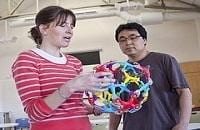
Brief Overview
Biomedical Engineering lies at the intersection of the physical and life sciences, incorporating principles from physics and chemistry to understand the operation of living systems. As in other engineering fields, the approach is highly quantitative: mathematical analysis and modeling are used to capture the function of systems from subcellular to organism scales. An education in Biomedical Engineering, and engineering more broadly, enables students to translate abstract hypothesis and scientific knowledge into working systems (e.g., prosthetic devices, imaging systems, and biopharmaceuticals). This enables one to both test the understanding of basic principles and to further this knowledge, and it places this understanding in the broader context of societal needs.
Learning Objectives
The overarching intellectual goal of biomedical engineering is to apply quantitative engineering analysis to understand the operation of living systems and design novel systems to satisfy unmet needs in medicine and industry. Specific objectives for students undertaking the A.B. in Biomedical Engineering are:
- Utilize mathematical analysis and modeling to capture the function of systems from subcellular to organism scales.
- Understand and apply the fundamental engineering disciplines (thermodynamics, fluid mechanics, kinetics); sciences (physics, biology, chemistry); and mathematics (statistics, differential equations) to solve biomedical problems.
- Translate scientific knowledge into working systems (e.g., prosthetic devices, imaging systems, and biopharmaceuticals).
- Gain depth of knowledge in chemical, biological, materials, and engineering science aspects of bioengineering.
Gateway Courses
- ENG-SCI 51 offered in Fall only
- ENG-SCI 53: Quantitative Physiology as a Basis for Engineering, Fall
- LS 1A: An Integrated Introduction to the Life Sciences, Fall (LPS A can also meet this requirement)
- Math, begin according to placement (Math Ma, Mb, 1a, b; or Math 21a, b)
- LS 1B: An Integrated Introduction to the Life Sciences: Genetics, Genomics, and
Evolution - Physics (APPHY 50A: Physics as a Foundation for Science and Engineering, Part I (spring), b or Physical Sciences 2, 3 or Physical Sciences 12a, b or Physics 15a, b)
- LS 50 may replace LS1A and LS1B
Concentration Advising Contacts
Professor Samir Mitragotri
Director of Undergraduate Studies
mitragotri@seas.harvard.edu
Linsey Moyer (Study Abroad Contact)
Associate Director of Undergraduate Studies
lmoyer@seas.harvard.edu
Sarah Colgan
Academic Programs Administrator
scolgan@seas.harvard.edu
Electrical Engineering
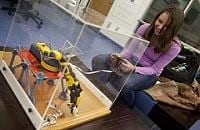
Brief Overview
Electrical Engineering has long played a critical role in driving the innovation that has improved quality of life, supported economic growth, and addressed societal problems. Its emergence as a separate field of study in the late 19th century paralleled, and was responsive to, the large-scale introduction of telegraphy and electrical lighting. Electrical engineering has continued to play a pivotal role in power and energy distribution, communications, and computation, even as the power-carrying channels have evolved from heavy metal cables to nanowires or optical fibers, the networks of communications have evolved from wires to wireless to neurons, and electrical switches have evolved from vacuum tubes to transistors to carbon nanotubes. The essential technologies that join us all together—mobile phones, laptops, wireless communications, downloaded videos, light-emitting diodes, electronic displays, the electrical power grid, and ATM transactions—are all evidence of the impact and continual innovation of electrical engineering.
Learning Objectives
Graduates of the Electrical Engineering program are prepared to address current and future societal challenges through the application of engineering principles using knowledge from the sciences, arts, and humanities in a wide range of professional fields, including engineering (particularly electrical engineering), law, medicine, public policy, education, design and business practice. To meet the needs of our constituents, our Program Education Objectives state that within a few years of graduation our graduates will have::
- Demonstrated technical competence, including design and problem-solving skills, leading to success in a diverse range of careers or fields of graduate study;
- Shown a commitment to working on solutions to problems with global, economic, environmental, and societal impacts;
- Been successful in a range of leadership and teamwork roles;
- Shown a commitment to lifelong learning through the pursuit of advanced degrees, professional certification, or knowledge of contemporary issues and recent advances in their field.
Gateway Courses
- Engineering Sciences 50, spring
- Math, begin according to placement: (Math Ma, Mb; 1a, 1b; Math 21a,b or Math 22a,b)
- Computer Science 32 (spring) or 50 (fall)
- Physics: (Physical Sciences 12a,b or Physics 15a,b or Applied Physics 50a,b)
Concentration Advising Contacts
Professor Demba Ba
Director of Undergraduate Studies
demba@seas.harvard.edu
Dr. Chris Lombardo (Study Abroad Contact)
Associate Director of Undergraduate Studies
lombardo@seas.harvard.edu
Sarah Colgan
Undergraduate Academic Programs Administrator
scolgan@seas.harvard.edu
Environmental Science and Engineering

Brief Overview
Environmental Science and Engineering (ESE) is an interdisciplinary program with the goal of understanding, predicting, and responding to natural and human-induced environmental change. Addressing environmental issues such as global warming, stratospheric ozone depletion, or local and regional air and water pollution requires perspectives from a diverse set of scientific disciplines including atmospheric physics and chemistry, oceanography, glaciology, hydrology, geophysics, ecology, and biogeochemistry. This program is structured around the view that the environmental system is comprised of a complex set of chemical, physical, and biological interactions, made even more complicated by the various activities of human society. Through exploration of the underlying processes and feedbacks within the Earth system, and with a range of approaches from theory and modeling to experiments and observations, students are trained to think about environmental processes in an integrated fashion, preparing them to manage the environmental challenges we face.
Learning Objectives
Students interested in environmental science and engineering study the fundamental processes and technologies underlying environmental systems, including natural and polluted waters and soils, the atmosphere, climate, and energy. Students learn to apply these principles to mitigate human impact on the environment by providing technical solutions and advancing innovations in environmental measurement, modeling, and control.
Gateway Courses
- LPSA or LS1A (fall)
- ESE 6: Intro to Environmental Science and Engineering (required), Fall
- PHYSCI 11: Foundations and Frontiers of Modern Chemistry, Spring
- GENED 1137: The Challenge of Human-Induced Climate Change: Transitioning to a Post-Fossil Fuel Future, Spring
- Math according to placement; also COMPSCI 50 or APPMTH 10
- GENED 1094: Confronting Climate Change: A Foundation in Science, Technology and Policy, Fall
- GENED 1085: Energy Resources and the Environment, Spring
- GENED 1158: Water and the Environment, Spring
- LS 50 may replace LS1A and LS1B
Concentration Advising Contacts
Professor Scot Martin
Director of Undergraduate Studies in Environmental Science and Engineering
smartin@seas.harvard.edu
Bryan Yoon (Study Abroad Contact)
Assistant Director of Undergraduate Studies in Environmental Science and Engineering
byoon@seas.harvard.edu
Sarah Colgan
Academic Programs Administrator
scolgan@seas.harvard.edu
Mathematics

Brief Overview
Mathematics is the science of order, and mathematicians seek to identify instances of order and to find notions and tools to perceive order where it is a priori hidden from view. Perhaps the most important concept of mathematics is that of function, which provides us with the means to study dependence and change. The study of real functions of a real variable (and later complex functions), particularly in connection with the limit concept, is called analysis. The most effective tool for this study is the infinitesimal calculus that analyzes the relation between functions and their derivatives. Then there are the notions and tools for the study of number systems and their generalizations; these form the branch of mathematics called algebra. Here the primary concepts are group, ring, field, and module. A third over-arching set of notions and tools concerns geometry, which now goes far beyond the classical study of the space we live in to include spaces of high dimension and the properties of classical and very non-classical notions of space (which is, in part, the subject of what is called topology).
Learning Objectives
The concentration in Mathematics is designed to acquaint the student with the most important general concepts underlying the three over-arching areas of mathematics; analysis, algebra and geometry. Concentration in mathematics will provide an adequate basis for further study in either pure or applied mathematics.
Gateway Courses
First year potential concentrators should enroll in a math course at the appropriate level. This will determine which course should be considered. For almost all, it will be one of:
- Math Qa and Qb: Quantitative Analysis for Economics and the Social Sciences
- Math Ma and Mb: Introduction to Functions and Calculus
- Math 1a: Introduction to Calculus (Offered both semesters.)
- Math 1b: Calculus, Series and Differential Equations (Offered both semesters.)
- Mathematics 21a: Multivariable Calculus (Offered both semesters.)
- Math 21b: Linear Algebra and Differential Equations (Offered both semesters.)
- Mathematics 22a and 22b: Vector calculus and Linear Algebra with Introduction to Proof.
- Mathematics 25a and 25b: Theoretical Linear Algebra and Real Analysis I and II (fall and spring)
- Math 55a and 55b: Studies in Algebra and Group Theory (55a), Studies in Real and Complex Analysis (55b)
- Math 101: Sets, Groups and Topology (Offered both fall and spring)
Students thinking to enroll in other Math courses should talk to a Math Department advisor to determine if more is needed by way of background (for example, the Math Department’s Director or Assistant Director of Undergraduate Studies). See the Math Department concentration information web page for more about concentrating in mathematics.
Concentration Advising Contacts
Cliff Taubes (Study Abroad Contact)
Director of Undergraduate Studies
chtaubes@math.harvard.edu
617-495-5579
Wes Cain
Assistant Director of Undergraduate Studies
jcain2@math.harvard.edu
617-495-1790
Mechanical Engineering

Brief Overview
Mechanical engineering is a discipline of engineering that uses the principles of physics and materials science for the analysis and design of mechanical and thermal systems. Mechanical engineering is critical to the success of many human enterprises – it plays a central role in the generation and distribution of energy, transportation, manufacturing, and infrastructure development. Nearly every product or service in modern life has been touched in some way by a mechanical engineer.
Learning Objectives
Graduates of the Mechanical Engineering program are prepared to address current and future societal challenges through the application of engineering principles using knowledge from the sciences, arts, and humanities in a wide range of professional fields, including engineering (particularly mechanical engineering), law, medicine, public policy, education, design and business practice. To meet the needs of our constituents, our Program Education Objectives state that within a few years of graduation our graduates will have:
- Demonstrated technical competence, including design and problem-solving skills, leading to success in a diverse range of careers or fields of graduate study;
- Shown a commitment to working on solutions to problems with global, economic, environmental, and societal impacts;
- Been successful in a range of leadership and teamwork roles;
- Shown a commitment to lifelong learning through the pursuit of advanced degrees, professional certification, or knowledge of contemporary issues and recent advances in their field.
Gateway Courses
- COMPSCI 50: Introduction to Computer Science -or- ENG-SCI 51: Computer-Aided Machine Design (fall)
- ENG-SCI 51: Computer-Aided Machine Design (fall)
- ENG-SCI 50: Intro to Electrical Engineering, spring (ENG-SCI 153 can also fulfill the electronics requirement)
- Math, begin according to placement (Math Ma, b, 1a, b; Applied Math 21a,b or Math 21a,b)
- Physics (Applied Physics 50a,b or Physical Sciences 12a,b or Physics 15a,b)
Concentration Advising Contacts
Seymur Hasanov (Study Abroad Contact)
Assistant Director of Undergraduate Studies
shasanov@seas.harvard.edu
Sarah Colgan
Academic Programs Administrator
scolgan@seas.harvard.edu
History
Anthropology

Brief Overview
Anthropology is the study of human diversity in the distant past and the present and teaches us to recognize the remarkable array of circumstances in which human beings live their lives and make meaning from them.
Learning Objectives
The study of anthropology prepares students to address global concerns through a contextualized study of society, culture and civilization, and can lead to careers in global health and medicine, law, government, museums, education, the arts, cultural and environmental management, business and entrepreneurship, among other fields, not to mention academia.
Gateway Courses
Archaeology
- Gened 1044: Deep History
- Gened 1105: Can We Know Our Past?
- Gened 1099: Pyramid Schemes: What Can Ancient Egyptian Civilizations Teach Us?
- Freshman Seminar 30g: Digging Egypt’s Past. Harvard and Egyptian Archaeology
- Freshman Seminar 44j: Clash of the Titans, Seats of the Empire: The Aztecs, Toltecs and Race of the Giants in Ancient Mexico
- Anthro 1038: Game of Stones: The Archaeology of Europe from Handaxes to Stonehenge (not offered 2024-2025)
- Anthro 1130: Archaeology of Harvard Yard
- Anthro 1190: American Invasions: Archaeological Tales of Encounter, Exploration, and Colonization, 1492-1830
- Anthro 1250: The Pyramids of Giza: Technology, Archaeology, History
Social Anthropology
- Gened 1093: Who Lives, Who Dies, Who Cares? Reimagining Global Health
- Gened 1126: Race and Caste
- Gened 1177: Language in Culture and Society
- Anthro 1602: Introduction to Sociocultural Anthropology (new!)
- Anthro 1603: The Law and its Limits
- Anthro 1610: Ethnographic Research Methods
- Anthro 1718: Activist, Collaborative, and Engaged Interventions in Anthropology
- Anthro 1824: Race and Genetics: American Biopolitics
- Anthro 1883: Where Science Meets Society: Introduction to STS
- Anthro 1906: Care in Critical Times
- ANTHRO 1602: Intro to Sociocultural Anthropology
- ANTHRO 1131: Archaeology of Harvard Yard II
Anthro 1038 Game of Stones: The Archaeology of Europe from Handaxes to Stonehenge (not offered 2024-2025)
Concentration Advising Contacts
Salmann Keshavjee
Director of Undergraduate Studies
salmaan_keshavjee@hms.harvard.edu
Damina Khaira
Assistant Director of Undergraduate Studies
Alexander Crosett
Undergraduate Program Coordinator
acrosett@fas.harvard.edu
617-495-3814
Undergraduate Program Team
anthrouc@fas.harvard.edu
Classics

Brief Overview
The study of the Classics is an interdisciplinary enterprise involving critical engagement with the literature, art, material culture, and history of the Greco-Roman world. A concentration in the Classics equips students with all the tools necessary for understanding the forms of expression and ways of life of the cultures of antiquity, and for understanding the development of those cultures over time. Concentrators learn skills that are broadly applicable to the analysis of any complex cultural system or artifact. They also acquire fluency in a tradition of art, literature, and philosophy that has been vitally relevant in many periods and contexts, and that remains highly influential today.
Learning Objectives
Classics concentrators gain familiarity with Latin or Greek (or both), learn how to handle complex evidence and how to write persuasively, and acquire an appreciation for, as well as a critical perspective on, key aspects of the cultural legacy of two of the civilizations that have most shaped the modern world.
Gateway Courses
- CLS-STDY 97A: Introduction to the Ancient Greek World
- CLS-STDY 97B: Introduction to the Ancient Roman World
- All introductory courses in Greek and Latin, e.g., LATIN 1; GREEK 1; MODGRK Aa.
- All CLS-STDY courses, except CLS-STDY 112, e.g., CLS-STDY 173: Gender in Byzantium; CLS-STDY 177: Fashion in the Ancient Mediterranean World; CLS-STDY 181: “Do as the Romans Do”: Roman Exemplarity in Antiquity and Beyond; CLS-STDY 190: Rhetoric, A User’s Guide: from Ancient Greece to Contemporary America
- GENED 1074: The Ancient Greek Hero
- GENED 1168: Tragedy Today
- CLASARCH 10: Greek Archaeology
Concentration Advising Contacts
David Elmer
Director of Undergraduate Studies
classicsDUS@fas.harvard.edu
617-495-4019
Emmi Farrell
Undergraduate Program and Scholarly Publications Coordinator
emmi_farrell@fas.harvard.edu
617-496-5977
Quick Links
Comparative Study of Religion
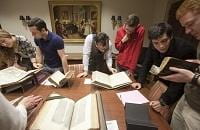
Brief Overview
The concentration in the Comparative Study of Religion invites students to explore the most consequential and momentous questions relevant to the understanding of individual and communal human life. Concentrators consider topics such as the significance of ritual and practice; differing conceptions of human nature and the nature of the divine; and comparative study of how people understand the meaning of life, suffering, and death. Our program is unique in allowing students to take up these and other “big” questions in rigorous and critical ways.
Learning Objectives
The Study of Religion as an interdisciplinary, academic field draws upon both social scientific and humanistic methods to interpret religious phenomena worldwide. The program stresses the acquisition of skills: (1) the arts of reading and interpreting texts, practices, and societies; (2) clear writing (essays are a substantial part of the requirements of the sophomore and junior tutorials), and (3) knowledge of the fundamental literature on theories of religion, and on various methods of study. Competency in religious studies indicates the ability to think critically and with historical and cultural learning about the complicated place of religious history, imagination, motivation, and memory in national and international affairs. Such skills have become one marker of an educated person, who is appropriately prepared for the responsibilities and pleasures of democratic citizenship and leadership.
Gateway Courses
Fall 2025
- GENED 1166 Pluralism: Case Studies in American Diversity (Eck)
- RELIGION 16: Religious Dimensions in Human Experience
- RELIGION 40: Incarnation and Desire: An Introduction to Christianity
- REL 1220a Introduction to the Hebrew Bible/Old Testament
- GENED 1118: The Holocaust
- GENED 1088: The Crusades and the Making of East and West
- REL 47 Christian Ethics and Contemporary Society (Lockwood)
- REL 1028 Icon or Idol: Attitudes to the Sacred Image (Patton)
- REL 1701 Introduction to Buddhist Scriptures and Their Critical Interpretation (Hallisey)
- REL 1400: Introduction to the New Testament
- GENED 1069: Faith & Authenticity: Religion, Existentialism and the Human Condition
- GENED 1071 African Spirituality and the Challenges of Modern Times (not offered 2024-2025)
- GENED 1123 Islam and Politics in the Modern Middle East (Malika Zeghal)
Spring 2026
- GENED 1001: Stories from the End of the World
- GENED 1087 Multisensory Religion: Rethinking Islam Through the Arts (Asani)
Concentration Advising Contacts
Courtney Bickel Lamberth (Study Abroad Contact)
Director of Undergraduate Studies
lamberth@fas.harvard.edu
617-495-2085
East Asian Studies

Brief Overview
To study East Asia is to be exposed to diverse forms of political activity and social relations, religious traditions of great depth, philosophical schools with enduring insights, and literatures of tremendous range and power. Concentrators in East Asian Studies develop an expertise in the region and gain a critical understanding of the human experience in East Asia and its diaspora. The program gives students the freedom, advising support, and infrastructure to study East Asia as a whole and to pursue specialized study of one or more societies from any disciplinary vantage point. Our students’ interests range from topics in sociology, government, and economics to art, literature, culture, and new media. East Asian Studies is an interdisciplinary concentration that welcomes students interested in the humanities and/or the social sciences.
Learning Objectives
A concentrator in East Asian Studies develops skills in a language, participates in the tutorial program, and selects from a rich offering of lecture courses and seminars. The concentration aims to examine East Asian cultures by foregrounding texts and voices from the region, past and present. Language study is therefore an important component of the program both for the practical benefits of proficiency for coursework and future careers, and as one of the most meaningful ways to expand one’s intellectual horizons and challenge preexisting worldviews. Students take language courses on campus and through Harvard’s numerous study-abroad opportunities in Asia. The concentration also accommodates students with different levels of time to devote to language learning and specialization through our individual tracks.
The tutorial program in East Asian Studies begins with EASTD 97 (normally taken in the sophomore year, but open to all years), which explores topics and concepts essential to studying the region and introduces methodologies and tools for critical thinking. By covering East Asia as a whole, the course provides a valuable comparative and interregional perspective. EASTD 98 and other eligible courses are junior tutorials in which students work closely with faculty to write a substantial research paper in their area of interest. Junior tutorials pave the way for EASTD 99ab, a seminar taken the entire senior year that allows students time to research, write, and receive feedback on senior theses.
Gateway Courses
- Language Courses: students are encouraged to begin language study in their first semester, if possible. Offerings include Chinese, Japanese, Korean, and Vietnamese, as well as Manchu, Mongolian, Uyghur, and Chaghatay.
- EAS97: Introduction to the Study of East Asia: Issues and Methods. Normally taken in the sophomore year, but open to all. (not offered 2024-2025)
EASTD 98K: Economic Governance in East Asia
EASTD 140 Major Religious Texts of East Asia
EASTD 141 – East Asian Religions; Traditions and Transformation
EASTD 170 Medicine and the Self in China and the West
EAFM 111 East Asian Media Studies
FRSEMR 61M Silk Road Stories
FRSEMR 71D Zen and the Art of Living
GENED 1049 East Asian Cinema
GENED 1091 Classical Chinese Ethical and Political Theory
GENED 1100 The Two Koreas in the Modern World
HIST 1023 Japan in Asia and the World
HIST 1610 East Asian Environments
CHNSLIT 114 Introduction to Premodern Chinese Literature
JAPNLIT 170 Traditional Japanese Literature
KORLIT 134 Korean Literature in Translation
For a more complete listing, visit: https://eas.fas.harvard.edu/area-courses
Concentration Advising Contacts
Melissa McCormick
Director of Undergraduate Studies
mccorm@fas.harvard.edu
617-496-2276
Naia Poyer (Study Abroad Contact)
Undergraduate Coordinator
eas@fas.harvard.edu
617-495-8365
Ethnicity, Migration, Rights**
Brief Description
The secondary field in Ethnicity, Migration, Rights (EMR) focuses on the closely linked areas of ethnicity, migration, and Indigeneity, with particular attention to Asian American and Pacific Islander, Latinx, Native American and Migration and Border Studies. Questions of rights– including political, legal, cultural, and economic rights – occupy an important position within studies of shifting landscapes of ethnicity, immigration, and Indigenous sovereignty. At EMR, studies of ethnicity, migration, and Indigeneity are understood as inseparable from analyses of race, gender, sexuality, disability, and other axes of difference and power. We strive to make these connections visible in our curriculum and programming, creating spaces for intersectional and interdisciplinary scholarly community. Students can declare a designated track in Latinx Studies or EMR.
Gateway Courses
- Several designated courses serve as “Portal Courses” to the field of EMR. Portal Courses are taught by faculty with expertise in one or more areas across ethnicity, migration, Indigeneity, and human rights. Portal Courses may be taken at any time in pursuit of the secondary field and are wonderful gateways to further study in EMR.
- Portal Courses:
- EMR 1010: Topics in Latinx Studies
- EMR 1020: Topics in Asian American and Pacific Islander Studies
- EMR 131/WGS 1283: Love’s Labors Found: Uncovering Histories of Emotional Labor
- EMR 1030: Topics in Native American & Indigenous Studies
- EMR 1040: Topics in Asian American Studies
- EMR 180: Introduction to Migration and Border Studies
Concentration Advising Contacts
Leslie Fernandez
Program Director
leslie_fernandez@fas.harvard.edu
History

Brief Overview
History is a broad discipline encompassing every dimension of human interaction in the past, including social life, the economy, culture, thought, and politics. Over the course of the concentration, History students encounter new ideas and new approaches to understanding the past and reckon with concepts that challenge their assumptions. As concentrators gain the skills of historical exploration, they contribute to our collective project of better understanding our pasts and using this knowledge to imagine a more just and egalitarian society.
Learning Objectives
The History Department teaches tomorrow’s leaders why yesterday matters. More concretely, the study of history holds vital lessons and skills: to appreciate change over time; to understand contingency, complexity, and diversity of perspectives; to analyze sources closely; to research deeply; to write clearly; and to speak with confidence. Graduates of the department always report that they find the skills they developed as historians to be essential to their professional work after college.
Gateway Courses
History 10: A History of the Present (new!)
HUM 20: A Colloquium in the Visual Arts (fall)
HAA 17K Introduction to Contemporary Art (fall)
HAA 18J – Introduction to Japanese Architecture (spring)
HAA 11 – Landmarks of World Architecture (spring)
HIST 23: Immigration Law
HIST 29: The Fall of the Roman Empire
HIST 14: The First World War
HIST 21: Labor, Liberty, and Conflict in American History
The History Department offers its gateway course during the fall semester, History 10A, A History of the Present. This entry-level course is perfect for all students, whether you’re considering the concentration or just searching for a class to round out your work in other divisions. To read more about History 10, visit the course site: https://canvas.harvard.edu/courses/139881. If you can’t make History 10, consider one of our introductory lecture courses instead: https://history.fas.harvard.edu/101_courses.
Foundations” 101 courses designed for first-year students (already filtered in my.harvard)
Introductory courses HAA 1-89—take one first year if possible; additional offerings 2024-2025: HAA 56G Spanish Golden Age Painting (Fall 2024), HAA 42P Architecture through the Ages: Notre-Dame-De-Paris (Fall 2024), HAA 15 – Introduction to Italian Renaissance Art (Spring 2025)
Concentration Advising Contacts
Ian Miller
Director of Undergraduate Studies
ian_miller@harvard.edu
Dr. Carla Heelan (Study Abroad Contact)
Asst. Director of Undergraduate Studies
cmheelan@fas.harvard.edu
Laura Johnson
Staff Assistant
lmjohns@fas.harvard.edu
617-495-2157
History and Literature
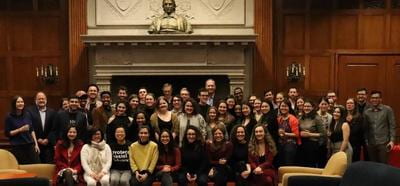
Brief Overview
Harvard’s oldest concentration, History & Literature is an interdisciplinary humanities program where you work closely with outstanding faculty in small-group and one-on-one tutorials. Beyond these tutorials, you take courses from a variety of departments as you develop your individual interests at the intersection of art, history, politics, and culture.
Learning Objectives
History & Literature is an honors concentration that helps you build the skills you need to write a thesis in your senior year. In small-group tutorials, we provide rigorous training in how to read and analyze a diverse array of primary and secondary sources, advise you as you conduct original research, and help you develop interdisciplinary approaches to the exciting material that you discover along the way.
Gateway Courses
- HUM 7 (Fall)
- Consider taking one of our HL90 Seminars to experience the kind of work we do in History & Literature. These courses are designed for first-year students and sophomores.
- You may also consider introduction to humanities courses such as HUM 10. Many GenEd courses that meet the Aesthetics & Culture requirement or the Histories, Societies, Individuals requirement also count for concentration credit in History & Literature.
Concentration Advising Contacts
Angela Allan
Associate Director of Studies
allan@fas.harvard.edu
History and Science

Brief Overview
History & Science is an interdisciplinary field of study. The program offers students a variety of opportunities to expand their understanding of the scientific enterprise and to explore in detail how science has developed in history and how science has shaped other human activities. Students are challenged to ask big questions about science, medicine, and technology, and their place in human societies across time. How do scientists come to know things about the natural world? Why should we believe what they tell us? What are some social, ethical, political and religious implications of science? How do they affect the way people in different times and places live their lives?
Learning Objectives
The History & Science concentration has two tracks. The Science and Society track is designed for students who want to combine history of science (and related areas) with training in a particular science area. We also have a special Medicine and Society option for pre-med students, as well as an option for students interested in Mind, Brain, Behavior or Technology, Information, and Society.
The History of Science track offers students the opportunity to take extra courses in history of science and related areas, and does not require any specific science courses. This track allows for more connections to be built to other relevant social science fields, such as sociology, philosophy, anthropology, or government.
Gateway Courses
- History of Science 100: Knowing the World: An Introduction to the History of Science (fall)
- HISTSCI 1445: Medicine and Health in America
- HISTSCI 101: Making the World: An Introduction to the History of Technology
- HISTSCI 1955: Science in Popular Culture
- General Education 1089: The Border: Race, Politics, and Health in Modern Mexico
- General Education 1116: Medical Ethics and History
- General Education 1127: Gender and Science
- General Education 1143: Dark Satanic Mills: How the Factory Made Our World
- General Education 1174. Life and Death In the Anthropocene
Concentration Advising Contacts
Anne Harrington
Director of Undergraduate Studies
aharring@fas.harvard.edu
(617) 496-5234
Alice Belser (Study Abroad Contact)
Manager of Student Programs, Concentration Advisor, Secondary Fields Contact
ajbelser@fas.harvard.edu
617-495-3742
History of Art and Architecture

Brief Overview
The History of Art & Architecture concentration offers training in the historical interpretation and critical analysis of the visual arts and architecture. It develops the skills of visual discrimination and verbal expression fundamental to art historical analysis. Art history is a multifaceted discipline embracing many different methods, perspectives and interests. Training in the critical analysis of art seeks to clarify the perception – and understanding – of how artworks relate to the techniques and materials used in their making, and to the environment in which they are seen. It also fosters the ability to make and explain judgments of quality and value.
Learning Objectives
Training in the critical analysis of art seeks to clarify the perception – and understanding – of how artworks relate to the techniques and materials used in their making, and to the environment in which they are seen. It also fosters the ability to make and explain judgments of quality and value.
Gateway Courses Fall 2025
- GENED 1185 – The Power and Beauty of Being In-Between: The Story of Armenia
- FYSEMR 63W – Vegetal Humanities
- FYSEMR 64I – Looking for Clues: Ancient and Medieval Art @ Harvard
- HAA 10 – Introduction to the History of Art
- HAA 15 – Introduction to Italian Renaissance Art
- HAA 22X – Architecture in the Early Modern Mediterranean World: A Cross-Cultural Perspective
Gateway Courses Spring 2026
- GENED 1083 – Permanent Impermanence: Why Buddhists Build Monuments
- FYSEMR 62M – Can Art Inspire Justice?
- FYSEMR 66J – Making Monsters in the Atlantic World
- HAA 11 Landmarks of World Architecture
- HAA 45M – Medieval Media
- HAA 51 – Witches. From Dürer to Goya
- HAA 73 – Money Matters
- HAA 77M – Modern Art & Its Colonial Matrix
Concentration Advising Contacts
Jennifer Roberts
Director of Undergraduate Studies
roberts6@fas.harvard.edu
617-496-0116
Professor Carrie Lambert-Beatty
Director of Senior Theses
lambert2@fas.harvard.edu
617-623-3432
Marcus Mayo (Study Abroad Contact)
Undergraduate Program Coordinator
marcus_mayo@fas.harvard.edu
617-495-2465
Medieval Studies**

Brief Description
The Committee on Medieval Studies is an interdisciplinary group of faculty who teach and study a thousand-year-long period of European, Near Eastern, and North African history and culture spanning the period between “Antiquity” (c. 1000 BCE -500 CE) and “Modernity” (c. 1500 CE onward), one that profoundly shaped Western as well as global society as we know it today. While learning about the vast and varied period known as the Middle Ages offers a unique and valuable perspective on modern history and culture, it also teaches us how people who are so much like us in so many ways also lived in a world that was completely different from our own. The Middle Ages is both “us” and “not us,” at once part of our collective heritage and something very, very different.
Learning Objectives
To discover the fascinating ways that human societies very different from our own functioned, invented, created, believed, and interacted with one another.
Gateway Courses
- Medieval Studies 250: At Cross Purposes: The Crusades in Material Culture
- History 1935: Byzantine Civilization
- History and Literature 90an: God Save the Queen! Ruling Women from Rome to the Renaissance
- HAA 12m: Monuments of Islamic Architecture
- HAA 42p: Architecture through the Ages: Notre-Dame de Paris
- Italian 138: The Cosmos of the Divine Comedy
Concentration Advising Contacts
Nicholas Watson
Chair of the Committee on Medieval Studies
nwatson@fas.harvard.edu
617-495-0969
Sean Gilsdorf
Director of Undergraduate Studies
gilsdorf@fas.harvard.edu
617-496-5857
Near Eastern Languages and Civilizations
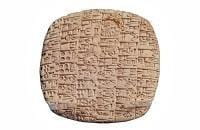
Brief Overview
The Department of Near Eastern Languages and Civilizations introduces students to the ancient and modern peoples, languages, cultures, and societies of the Near/Middle East. Loosely defined as stretching from Morocco in the west to Iran and Afghanistan in the east, the region is home some of the world’s great religions and civilizations. Historically, the influence of its languages, literatures and cultures has extended to Central, East and Southeast Asia, sub-Saharan Africa, Europe and North America. Thus, the study of the Near and Middle East is an important area of academic inquiry on account of its political, economic and cultural significance on the international stage.
Learning Objectives
The concentration offers students a multi-faceted and inter-disciplinary perspective on Near Middle Eastern cultures and languages that have been so influential throughout the world. Undergraduate concentrators develop skills in one or more of the languages of the region on their way to choosing from a wide variety of directions of study. The Department offers instruction in a range of ancient and modern languages including Akkadian, Arabic, Aramaic, Armenian, Egyptian, Hebrew, Iranian, Persian, Sumerian, Turkish (Ottoman and Modern), and Yiddish. The concentration provides a solid grounding in the student’s area of focus and offers an in-depth look at how scholars explore these languages and their associated cultures that have been so influential throughout the world.
Gateway Courses
- ANE 106 Ancient Mesopotamian Literature: 2000 Years of Early Storytelling (Hawkins) S22
- ANE 109: First Civilizations: History and Archeology of the Ancient Near East
- ANE 197 Bible and Empire (Rhyder) F21
- ANE 170 Food, Identity and the Biblical World
- GENED 1090 What Is a Book? From the Clay Tablet to the Kindle (Stern) S22
- GENED 1099 Pyramid Schemes: What Can Ancient Egyptian Civilization Teach Us? (Manuelian) S22
- ISLAMCIV 145a Introduction to Islamic Philosophy and Theology (El-Rouayheb) F21
- ISLAMICCIV 163 Introduction to Islamic Mystical Traditions (Asani) F21
- MODMDEST 100 The Modern Middle East, Real and Imagined (Zeghal) F21
- NEC 101 Historical Background to the Contemporary Middle East (Barjamovic) S22
- PERSIAN 152 Literary and Visual Narrative in the Persian Epic Tradition (Landau) F21
- YIDDISH 107 The Politics of Yiddish (Zaritt) F21
- JEWISHST 164: Jews in the Americas
- JEWISHST 131: The Jewish Library: Four Jewish Classics
- ANE 116: Age of Empires: Violence, Ideology, and the Making of Ancient Near Eastern
Societies
For a more complete listing, visit: nelc.fas.harvard.edu/gateway-courses
Concentration Advising Contacts
Gojko Barjamovic (Study Abroad Contact)
Director of Undergraduate Studies, Secondary Field Contact
barjamovic@fas.harvard.edu
617-495-6009
Eva Misho (Study Abroad Contact)
Student Coordinator
eva_misho@fas.harvard.edu
617-496-4960
Nevenka Korica Sullivan
Interim Director of Modern Language Programs
nevenkakorica@fas.harvard.edu
617-495-1002
Philosophy

Brief Overview
Philosophy studies many of humanity’s fundamental questions: how should we live, what kind of society should we strive towards, what are the limits of human knowledge? What is truth? Justice? Beauty? These questions are central to our lives, because in much of what we do, we at least implicitly assume answers to them. Philosophy seeks to reflect on these questions and answer them in a systematic, explicit, and rigorous way—relying on careful argumentation, and drawing from outside fields as diverse as economics, literature, religion, law, mathematics, the physical sciences, and psychology. And while most of the tradition of philosophy is Western, we seek to connect with non-Western traditions like Islam and Buddhism, as well.
Learning Objectives
Students develop their own responses to the philosophical problems that attract them in conjunction with their study of philosophical writing. The department’s introductory courses help students to develop their reading, writing, and reasoning skills while acquainting them with broad surveys of major areas and historical periods. The department’s more advanced courses focus on more specific topics and allow students to explore their interests in the context of the broad foundation they acquired in the introductory courses. The skills that philosophy teaches students will always be in high demand: the ability to think and write clearly, the ability to bring to light unnoticed presuppositions, to explain complex ideas clearly, to tease out connections and implications, to see things in a broader context, to challenge orthodoxy.
Gateway Courses
- GENED 1046 Race and Social Justice
- FRSEM 23c Exploring the Infinite
- FRSEM 30q Death and Immortality
- FRSEM 56F The Good, the Bad, and the Beautiful: The Ethics of Art
- PHIL 3 The True and The Good (not offered 2024-2025)
- PHIL 4: Logic I
- PHIL 7: Introduction to Ancient Greek and Roman Philosophy
- PHIL 6 Ancient Ethics and Modern Morality
- PHIL 8: Self and World: Early Modern Philosophy
- PHIL 27 Truth, Lies, and the Press
- PHIL 34 Existentialism in Literature and Film
- GENED 1025 Happiness
- FRSEM 63x Happiness and Different Ways of Life
- PHIL 8 Self and World: An Introduction to Early Modern Philosophy
- PHIL 9: Empiricists, Scientists, and Charlatans: An Introduction to the Philosophy of Science
- PHIL 11 Philosophy of Law
- PHIL 18 Human Ethics: A Brief History
Concentration Advising Contacts
Ned Hall
Director of Undergraduate Studies/Head Tutor
ehall@fas.harvard.edu
Emily Ware
Department Administrator
eware@fas.harvard.edu
Michael Ricca
Undergraduate Program Coordinator
michael_ricca@harvard.edu
Russia, Eastern Europe, and Central Asia**

Brief Overview
The secondary field in Regional Studies: Russia, Eastern Europe, and Central Asia (REECA) offers students the opportunity to pursue interdisciplinary work on the history and society of this world region. The field requirements are based on the premise that when studying society and culture, the integration of various academic disciplines allows insights unobtainable within the confines of a single discipline. While the field may integrate the study of language, literature, and culture, the primary emphasis here is on the social sciences, including history.
Learning Objectives
As a REECA secondary field concentrator, you’ll explore the social, economic, historical, and political forces that drive the countries which straddle the divide between Europe and Asia. Individual advising will allow you to tailor the geographic and disciplinary focus to your own academic and career goals.
Requirements
Russia, Eastern Europe, and Central Asia: 5 courses (20 credits)
- A minimum of three courses (12 credits) must be in the social sciences (for example, Anthropology, Economics, Government, History).
- A minimum of three courses (12 credits) must be regular departmental courses (i.e., not General Education courses or First-Year Seminars).
- The five courses must be distributed across at least two different disciplines or departments.
- One course (four credits) of relevant language study may count toward the secondary field. For Russian, students may count any course at the level of RUSS 103 or higher. For non-Russian languages of the region, students who complete at least one full year (eight credits) of study may count four credits toward the secondary field.
Gateway Courses
Browse regional course listings by entering “REECA” in the course search box on my.harvard to find a Freshman Seminar or General Education course that appeals to you. You can also email reeca@fas.harvard.edu to get personalized recommendations. Don’t have room in your schedule for a class on REECA this term? Check out the Davis Center’s Facebook page at facebook.com/DCRES for more ideas about how to learn more about this critical region.
Other Information
To browse region-related courses that may be eligible for secondary field credit, enter “reeca” in the course search field on courses.my.harvard.edu.
All courses must be taken for a letter grade and must be completed with a grade of B- or above, with the exception of First-Year Seminars, which may be applied toward the secondary field with a grade of SAT. Credit for courses from Harvard Summer School and other Harvard faculties may be granted upon petition. Study abroad is encouraged, and four units of study abroad credit may be applied toward the secondary field, with prior approval of the REECA academic adviser. Students should note that the Davis Center cannot guarantee students pursuing a secondary field preferential access to limited-enrollment courses.
Advising Resources and Expectations
Email the REECA Coordinator at reeca@fas.harvard.edu for advising on the program and course selection, as well as for referrals to individual faculty as needed. Students are also encouraged to sign up for the Davis Center mailing list to stay abreast of co-curricular activities related to the region.
Donna Griesenbeck
Student Program Officer
griesenb@fas.harvard.edu
617-495-1194
CGIS South 334
South Asian Studies

Brief Overview
A concentration in South Asian Studies enables students to develop a critical understanding of the diverse cultures, histories, languages and literatures of South Asia, which includes Bangladesh, India, Nepal, Pakistan, Sri Lanka, and Tibet. South Asia is home to more than a billion people and some of the world’s most fascinating and important civilizations. Its influence has extended historically from Central, East, and Southeast Asia to Europe and North America, which today have vibrant South Asian diasporas. The study of South Asia is an increasingly important area of academic inquiry, especially in recent decades as the region emerges as a global cultural, economic, and political power.
Gateway Courses
- CULTBLF 28: Hindu Worlds of Art and Culture
- CULTBLF 60: Religion in India – Texts and Traditions in a Complex Society
- ER 19: The Good Life in Classical India
- FRSEMR 32X: Topics in Indo-Tibetan Buddhism
- FYSEMR 37Y: Muslim Voices in Contemporary World Literature
- GENED 1987: Multisensory Religion: Rethinking Islam
- HAA 18S: Arts of South and Southeast Asia
- HIST 1036: Modern South Asia
- SAS 108: Introduction to the Hindu Calendar as a Lived Experience
- South Asian Language Study
Concentration Advising Contacts
Martha Selby
Department Chair
marthaselby@fas.harvard.edu
617-496-5697
Jonathan Ripley
Director of Undergraduate Studies
jripley@fas.harvard.edu
617-496-4749
European History, Politics, and Societies**

Brief Overview
The Secondary Field in European History, Politics, and Societies (EHPS) offers students the opportunity to pursue an interdisciplinary course of study focused on modern Europe, in particular its politics, economics, history, and social and cultural developments.
Learning Objectives
While the EHPS rests mainly on courses from the social science disciplines, it also includes those considering Europe in a comparative context as well as courses covering a specific period or region of Europe. In addition, it provides for a humanistic inquiry of Europe reflecting its diverse cultural and linguistic heritage through a broad array of courses from the humanities departments.
Gateway Courses
Information about courses can be found here: https://ces.fas.harvard.edu/opportunities/undergraduates/secondary-field-in-european-history-politics-and-societies-ehps
Concentration Advising Contacts
Gila Naderi
Director of Communications
gilanaderi@fas.harvard.edu
Albana Shehaj
Program Manager
albana.shehaj@fas.harvard.edu
Elaine Papoulias
Executive Director of CES
epapoulias@fas.harvard.edu
Languages & Literatures
Celtic Languages and Literatures**
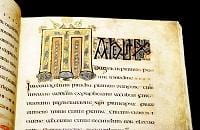
Brief Overview
Harvard is the only university in the United States where you can explore the culture, literature, history and languages of all the Celtic-speaking peoples. A secondary field in Celtic will introduce you to a vibrant and varied subject that encompasses literatures and languages from medieval to contemporary. Some students take a broad interest in the Celtic cultures, others in Celtic folklore and mythology, and some in the Celtic languages and literatures of Ireland, Scotland, or Wales.
Learning Objectives
Students who complete a Secondary Field in Celtic may expect, not only to become familiar with the origins of the Celtic peoples and the growth of their cultural traditions, but also to understand better the foundations of ethnicity in any people that understands itself as possessing a distinct identity; to develop a keen critical awareness of the nature and vitality of oral traditions in their vibrant interrelationships with literary traditions; and to be aware of the precarious state of many of the world’s seven thousand languages, and why it matters.
Gateway Courses
- CELTIC 101: Irish Heroic Saga
- CELTIC 111: Shapeshifting and Identity in Celtic Traditions
- CELTIC 187: Literature of the Dispossessed
- CELTIC 188: Songs of the Highlander
Concentration Advising Contacts
Catherine McKenna
Department Chair
cmckenna@fas.harvard.edu
617-495-1206
Natasha Sumner
Director of Undergraduate Studies
nsumner@fas.harvard.edu
617-495-1206
Mary Violette
Department Administrator
violette@fas.harvard.edu
617-495-1206
Classics

Brief Overview
The study of the Classics is an interdisciplinary enterprise involving critical engagement with the literature, art, material culture, and history of the Greco-Roman world. A concentration in the Classics equips students with all the tools necessary for understanding the forms of expression and ways of life of the cultures of antiquity, and for understanding the development of those cultures over time. Concentrators learn skills that are broadly applicable to the analysis of any complex cultural system or artifact. They also acquire fluency in a tradition of art, literature, and philosophy that has been vitally relevant in many periods and contexts, and that remains highly influential today.
Learning Objectives
Classics concentrators gain familiarity with Latin or Greek (or both), learn how to handle complex evidence and how to write persuasively, and acquire an appreciation for, as well as a critical perspective on, key aspects of the cultural legacy of two of the civilizations that have most shaped the modern world.
Gateway Courses
- CLS-STDY 97A: Introduction to the Ancient Greek World
- CLS-STDY 97B: Introduction to the Ancient Roman World
- All introductory courses in Greek and Latin, e.g., LATIN 1; GREEK 1; MODGRK Aa.
- All CLS-STDY courses, except CLS-STDY 112, e.g., CLS-STDY 173: Gender in Byzantium; CLS-STDY 177: Fashion in the Ancient Mediterranean World; CLS-STDY 181: “Do as the Romans Do”: Roman Exemplarity in Antiquity and Beyond; CLS-STDY 190: Rhetoric, A User’s Guide: from Ancient Greece to Contemporary America
- GENED 1074: The Ancient Greek Hero
- GENED 1168: Tragedy Today
- CLASARCH 10: Greek Archaeology
Concentration Advising Contacts
David Elmer
Director of Undergraduate Studies
classicsDUS@fas.harvard.edu
617-495-4019
Emmi Farrell
Undergraduate Program and Scholarly Publications Coordinator
emmi_farrell@fas.harvard.edu
617-496-5977
Quick Links
Comparative Literature

Brief Overview
Comparative literature is the department for students who want to cross boundaries — between languages, between cultures, between disciplines. We welcome students who are interested in studying literature in more than one national and linguistic tradition, students who want to explore literature in relation to other arts and media (e.g., film, music, visual art) or disciplines (e.g., philosophy, government, WGS, religion), and students who seek to formulate an individualized program of study within the arts and humanities.
Learning Objectives
Students with degrees in Comparative Literature develop habits of mind that serve them well in any number of professional endeavors. The ability to write well, to read critically, to argue analytically, and to speak eloquently, translates fluently to a variety of fields.
Gateway Courses
- COMPLIT 153 – Nabokov (fall)
- COMPLIT 119 – Mainstream Jews (fall)
- COMPLIT 123X: On Stolen Land: Indigenous Latin America in 20th and 21st Century
Literature - COMPLIT 172: Comparative Literatures of the Indian Ocean
- COMPLIT 100X: What Is a Novel?
- COMPLIT 97: Sophomore Tutorial
- Any Comparative Literature 100 course; develop language competency; also on offer Fall 2024 COMPLIT 111X – Breaking Points: Art, Scholarship and Social Movements
- Any course listed under the Comparative Literature rubric provides an excellent way of exploring the concentration. Students are especially encouraged to enroll in any of the Comparative Literature 100 classes to get a sense of what the study of comparative literature entails.
- Students might also consider enrolling in a course from any of the departments in the Humanities that address their interests, e.g. English; any non-English literature department (e.g., Slavic, Romance Languages, East Asian Languages, Near Eastern Languages); Philosophy; AFVS; and Women, Gender and Sexuality.
- Another great option is a course in a non-English literature or a language course in the foreign language the student wishes to study.
Concentration Advising Contacts
Sandra Naddaff (Study Abroad Contact)
Director of Undergraduate Studes
snaddaff@fas.harvard.edu
617-495-5650
Isaure Mignotte
Program Coordinator
mignotte@fas.harvad.edu
617-495-4186
Comparative Study of Religion

Brief Overview
The concentration in the Comparative Study of Religion invites students to explore the most consequential and momentous questions relevant to the understanding of individual and communal human life. Concentrators consider topics such as the significance of ritual and practice; differing conceptions of human nature and the nature of the divine; and comparative study of how people understand the meaning of life, suffering, and death. Our program is unique in allowing students to take up these and other “big” questions in rigorous and critical ways.
Learning Objectives
The Study of Religion as an interdisciplinary, academic field draws upon both social scientific and humanistic methods to interpret religious phenomena worldwide. The program stresses the acquisition of skills: (1) the arts of reading and interpreting texts, practices, and societies; (2) clear writing (essays are a substantial part of the requirements of the sophomore and junior tutorials), and (3) knowledge of the fundamental literature on theories of religion, and on various methods of study. Competency in religious studies indicates the ability to think critically and with historical and cultural learning about the complicated place of religious history, imagination, motivation, and memory in national and international affairs. Such skills have become one marker of an educated person, who is appropriately prepared for the responsibilities and pleasures of democratic citizenship and leadership.
Gateway Courses
Fall 2025
- GENED 1166 Pluralism: Case Studies in American Diversity (Eck)
- REL 47 Christian Ethics and Contemporary Society (Lockwood)
- REL 1028 Icon or Idol: Attitudes to the Sacred Image (Patton)
- REL 1220a Introduction to the Hebrew Bible/Old Testament
- REL 1400: Introduction to the New Testament
- REL 1701 Introduction to Buddhist Scriptures and Their Critical Interpretation (Hallisey)
- GENED 1069: Faith & Authenticity: Religion, Existentialism and the Human Condition
- GENED 1071 African Spirituality and the Challenges of Modern Times (not offered 2024-2025)
- GENED 1123 Islam and Politics in the Modern Middle East (Malika Zeghal)
- RELIGION 16: Religious Dimensions in Human Experience
- RELIGION 40: Incarnation and Desire: An Introduction to Christianity
- GENED 1118: The Holocaust
- GENED 1088: The Crusades and the Making of East and West
Spring 2026
- GENED 1001: Stories from the End of the World
- GENED 1087 Multisensory Religion: Rethinking Islam Through the Arts (Asani)
Concentration Advising Contacts
Courtney Bickel Lamberth (Study Abroad Contact)
Director of Undergraduate Studies
lamberth@fas.harvard.edu
617-495-2085
East Asian Studies

Brief Overview
To study East Asia is to be exposed to diverse forms of political activity and social relations, religious traditions of great depth, philosophical schools with enduring insights, and literatures of tremendous range and power. Concentrators in East Asian Studies develop an expertise in the region and gain a critical understanding of the human experience in East Asia and its diaspora. The program gives students the freedom, advising support, and infrastructure to study East Asia as a whole and to pursue specialized study of one or more societies from any disciplinary vantage point. Our students’ interests range from topics in sociology, government, and economics to art, literature, culture, and new media. East Asian Studies is an interdisciplinary concentration that welcomes students interested in the humanities and/or the social sciences.
Learning Objectives
A concentrator in East Asian Studies develops skills in a language, participates in the tutorial program, and selects from a rich offering of lecture courses and seminars. The concentration aims to examine East Asian cultures by foregrounding texts and voices from the region, past and present. Language study is therefore an important component of the program both for the practical benefits of proficiency for coursework and future careers, and as one of the most meaningful ways to expand one’s intellectual horizons and challenge preexisting worldviews. Students take language courses on campus and through Harvard’s numerous study-abroad opportunities in Asia. The concentration also accommodates students with different levels of time to devote to language learning and specialization through our individual tracks.
The tutorial program in East Asian Studies begins with EASTD 97 (normally taken in the sophomore year, but open to all years), which explores topics and concepts essential to studying the region and introduces methodologies and tools for critical thinking. By covering East Asia as a whole, the course provides a valuable comparative and interregional perspective. EASTD 98 and other eligible courses are junior tutorials in which students work closely with faculty to write a substantial research paper in their area of interest. Junior tutorials pave the way for EASTD 99ab, a seminar taken the entire senior year that allows students time to research, write, and receive feedback on senior theses.
Gateway Courses
- Language Courses: students are encouraged to begin language study in their first semester, if possible. Offerings include Chinese, Japanese, Korean, and Vietnamese, as well as Manchu, Mongolian, Uyghur, and Chaghatay.
- EAS97: Introduction to the Study of East Asia: Issues and Methods. Normally taken in the sophomore year, but open to all. (not offered 2024-2025)
EASTD 140 Major Religious Texts of East Asia
EASTD 141: East Asian Religions: Traditions and Transformation
EASTD 170 Medicine and the Self in China and the West
EAFM 111 East Asian Media Studies
FRSEMR 61M Silk Road Stories
FRSEMR 71D Zen and the Art of Living
EASTD 98K: Economic Governance in East Asia
GENED 1049 East Asian Cinema
GENED 1091 Classical Chinese Ethical and Political Theory
GENED 1100 The Two Koreas in the Modern World
HIST 1023 Japan in Asia and the World
HIST 1610 East Asian Environments
CHNSLIT 114 Introduction to Premodern Chinese Literature
JAPNLIT 170 Traditional Japanese Literature
KORLIT 134 Korean Literature in Translation
For a more complete listing, visit: https://eas.fas.harvard.edu/area-courses
Concentration Advising Contacts
Professor Shigehisa Kuriyama
Director of Undergraduate Studies
hkuriyam@fas.harvard.edu
617-496-2276
Naia Poyer (Study Abroad Contact)
Undergraduate Coordinator
eas@fas.harvard.edu
617-495-8365
English

Brief Description
Humans use stories to cope and thrive, from oral poetic traditions to novels, screenplays, and hip hop rhymes. The English Department hones your expertise as a maker and interpreter of stories. By studying English literature, you will learn how to analyze and appreciate the language of the past and to craft new narratives for the future. You will develop expertise in communicating meaningfully through language and in interpreting others’ rhetoric, skills more crucial than ever in our text-saturated world. Along the way, you will both devise and encounter dazzling imaginary worlds that bring readers and writers together across vast expanses of space and time.
We commit ourselves to helping students immerse themselves in the literary worlds they know and love, discover new worlds they might not think to explore, acquire the means to write and read according to their own developing tastes, and sustain themselves on their intellectual and creative journeys.
Learning Objectives
A degree in English prepares students for every field that values persuasive writing, careful reading, and clear thinking. Our concentrators enter their lives and careers after Harvard able to:
- write and speak persuasively and with nuance in one or more literary genres, including the genres of non-fiction;
- enjoy literary texts aesthetically (in the body) and philosophically (in the mind);
- analyze texts from stylistic, generic, contextual, and theoretical perspectives;
- understand the difference between good and bad arguments;
- conduct research and present it lucidly in written and oral forms;
- read, perform, and write literary texts with a trained awareness of how they at once shape and are shaped by the societies in which they are written and received.
Gateway Courses
- English 10: Literature Today
- English 20: Literary Forms
- English 10, English 20, and English 97 are concentration requirements and are designed to provide a common foundation for concentrators. If you’ve enjoyed previous coursework in English literature but are not sure where to start, we recommend beginning with English 10. It is also worth noting that while English 20 and 97 are offered every semester, English 10 is only offered in the fall each year. Students are also welcome to enroll in or apply for admission to any English class, including creative writing workshops and other courses taught by English Department faculty such as Humanities 10 or our exciting array of General Education courses. Visit the course listings on our website to see our offerings. We welcome you to chat with us about where to start in our creative writing program and how to find courses featuring your favorite authors, genres, or themes.
- HUM 10A (fall 2024)
- HUM 10B (spring 2025)
Concentration Advising Contacts
Prof. Leah Whittington
Director of Undergraduate Studies
EnglishDUS@fas.harvard.edu
Prof. Tara Menon
Associate Director of Undergraduate Studies
English-ADUS@fas.harvard.edu
Lauren Bimmler
Undergraduate Program Administrator
lbimmler@fas.harvard.edu.
Emily Miller
Undergraduate Program Assistant
emily_miller@fas.harvard.edu
Ethnicity, Migration, Rights**
Brief Description
The secondary field in Ethnicity, Migration, Rights (EMR) focuses on the closely linked areas of ethnicity, migration, and Indigeneity, with particular attention to Asian American and Pacific Islander, Latinx, Native American and Migration and Border Studies. Questions of rights– including political, legal, cultural, and economic rights – occupy an important position within studies of shifting landscapes of ethnicity, immigration, and Indigenous sovereignty. At EMR, studies of ethnicity, migration, and Indigeneity are understood as inseparable from analyses of race, gender, sexuality, disability, and other axes of difference and power. We strive to make these connections visible in our curriculum and programming, creating spaces for intersectional and interdisciplinary scholarly community. Students can declare a designated track in Latinx Studies or EMR.
Gateway Courses
- Several designated courses serve as “Portal Courses” to the field of EMR. Portal Courses are taught by faculty with expertise in one or more areas across ethnicity, migration, Indigeneity, and human rights. Portal Courses may be taken at any time in pursuit of the secondary field and are wonderful gateways to further study in EMR.
- Portal Courses:
- EMR 1010: Topics in Latinx Studies
- EMR 1020: Topics in Asian American and Pacific Islander Studies
- EMR 131/WGS 1283: Love’s Labors Found: Uncovering Histories of Emotional Labor
- EMR 1030: Topics in Native American & Indigenous Studies
- EMR 1040: Topics in Asian American Studies
- EMR 180: Introduction to Migration and Border Studies
Concentration Advising Contacts
Leslie Fernandez
Program Director
leslie_fernandez@fas.harvard.edu
Folklore and Mythology
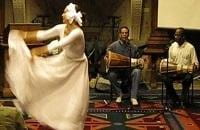
Brief Overview
Folklore and Mythology is a liberal education in and of itself. The program encourages the study of any given community through its language and culture, offering an array of choices for drawing on a variety of disciplines in the humanities and social sciences. To focus on the folklore and mythology of a community (at local, regional, national, or even trans-national levels) is to understand how that group or society defines itself through stories, music, food, folktales, legends, dramas, dance, rituals, beliefs, proverbs, epics, myths, customs, law codes, festival celebrations, “wisdom literature,” and many other forms of expressive culture and artistic communication. To study the folklore and mythology of any group is to discover how that group identifies itself in relation to others.
Learning Objectives
Concentrators conduct independent research on the material, oral, written, or performed forms of folklore and mythology in their areas of specialization, which range greatly across time and space. Our students develop and practice folkloristic methods — deep listening, observant participation, cross-cultural comparison, historical contextualization, collaborative interpretation, cultural documentation, empathetic engagement, and good storytelling — in relationship to whichever communities most interest and enthrall them.
Gateway Courses
- GENED 1079: Tradition, Performance, and Culture
- GENED 1196: The Artfulness of Everyday Life (fall)
- FOLKMYTH 106: The History of Witchcraft and Charm Magic
- FOLKMYTH 111: Folklore of Food
- FOLKMYTH 120: Folklore and Appalachia
- FOLKMYTH 130: The Folklore of Emergency: Change, Continuity, and Communal Creativity Amid Crisis
- FOLKMYTH 150: Internet Folklore, Online Communities, and Digital Ethnography
- FOLKMYTH 160: Scandinavian Folklore: Trolls, Trolldom and the Uses of Tradition
- FOLKMYTH 176: Tattoo: Histories and Practices
- FOLKMYTH 172: Quilts and Quiltmaking
- FOLKMYTH 97: Fieldwork and Ethnography in Folklore: A Tutorial in Cultural Documentation (spring)
Concentration Advising Contacts
Dr. Sarah Craycraft (Study Abroad Contact)
Director of Undergraduate Studies
scraycraft@fas.harvard.edu
Germanic Languages and Literatures

Brief Overview
Our program invites you to explore the languages, literatures, societies and cultures of the German-speaking and Scandinavian regions of Europe: Germany, Austria, Switzerland, Liechtenstein; and Denmark, Iceland, Norway, and Sweden. We offer language courses in German and Swedish as well as tutorials in Danish, Dutch, Icelandic, Norwegian, and Old Norse, all of which provide a gateway to an exciting exploration of the tremendous impact these cultures have had on the development of Western civilization – from the Vikings to the present day.
Learning Objectives
Our goal is to provide students with the enriching experience of studying languages, literatures, and cultures different from their own so they can gain new perspectives on their languages and countries of origin. By acquiring proficiency in German, Dutch, or a Scandinavian language, students will gain a lasting skill useful in many fields of endeavor. Advanced study builds on these foundations by further developing critical and creative thinking, by teaching students how to pursue their own research questions, and by making deeper connections to related fields of study, including philosophy, comparative literature, music, art history, media studies, theater and the visual arts.
Gateway Courses
Freshmen are encouraged to take language courses in the department at the appropriate level as determined by the Harvard Placement test in German or their SAT II test. We offer both regular and intensive language courses at the beginning and intermediate level as well as a third- year language sequence in German.
Fall:
- Frsh Sem 63L: Memory Wars: Cultural Trauma and the Power of Literature
- German 10a: Beginning German
- Swedish 10a: Beginning Swedish
- German 143: German History from Bismarck to Hitler (not offered 2024-2025)
- GERMAN 173: German Poetry Today
- COMPLIT 100X: Introduction to German Literature, History and Thought
Spring
- German 10b: Beginning German
- Swedish 10b: Beginning Swedish II
- German 146: The Ethics of Atheism: Marx, Nietzsche, Freud
- German 171: Just Law? Truth, Trial & Error in German Literature
- German 180: Bargaining with the Devila; The Faust Legend
We offer further opportunities for language study through the Harvard Summer School: Intensive advanced German in Vienna and Berlin, and a fully, not merely token, interdisciplinary HSS course on the historical, literary and material culture aspects of the period known as the Viking Age (ca. AD 750- 1100) is offered in Scandinavia.
Concentration Advising Contacts
Ekaterina Pirozhenko
Director of Undergraduate Studies, German
ekaterinapirozhenko@fas.harvard.edu
617-495-3548
Agnes Broomé
Director of Undergraduate Studies, Scandinavian
agnesbroome@fas.harvard.edu
617-496-4158
Ruth Sondermann
Work Abroad Program Director
sonderm@g.harvard.edu
Andreea Florescu D’Abramo
Department Administrator
adabramo@fas.harvard.edu
617-495-2347
History and Literature

Brief Overview
Harvard’s oldest concentration, History & Literature is an interdisciplinary humanities program where you work closely with outstanding faculty in small-group and one-on-one tutorials. Beyond these tutorials, you take courses from a variety of departments as you develop your individual interests at the intersection of art, history, politics, and culture.
Learning Objectives
History & Literature is an honors concentration that helps you build the skills you need to write a thesis in your senior year. In small-group tutorials, we provide rigorous training in how to read and analyze a diverse array of primary and secondary sources, advise you as you conduct original research, and help you develop interdisciplinary approaches to the exciting material that you discover along the way.
Gateway Courses
- HUM 7 (fall)
- Consider taking one of our HL90 Seminars to experience the kind of work we do in History & Literature. These courses are designed for first-year students and sophomores.
- You may also consider introduction to humanities courses such as HUM 10. Many GenEd courses that meet the Aesthetics & Culture requirement or the Histories, Societies, Individuals requirement also count for concentration credit in History & Literature.
Concentration Advising Contacts
Angela Allan
Associate Director of Studies
allan@fas.harvard.edu
Linguistics
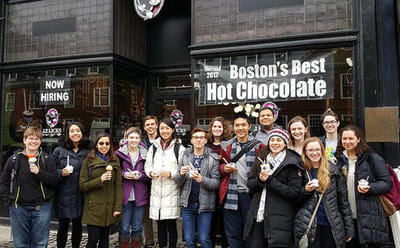
Brief Overview
Linguists are engaged in the study of language structure, which is the ultimate interdisciplinary enterprise. Linguistic theory attempts to model a complex domain of human knowledge that is also central to philosophy of mind and to cognitive psychology. The linguistic models that theoretical linguists construct are formal in character and rely on computational and mathematical methodologies. As such, linguistics has a mutually beneficial relationship with computer science and the study of artificial intelligence.
Learning Objectives
An undergraduate degree in linguistics will give you insight into one of the most fascinating aspects of human knowledge and behavior. As a linguistics major, you will learn about many aspects of human language, including sounds (phonetics, phonology), words (morphology), sentences (syntax), and meanings (semantics).
In exploring these and similar topics, students of linguistics not only learn a great deal about a fascinating field; they also master a variety of conceptual and empirical techniques that stand them in good stead after graduation.
Gateway Courses
For a broad introduction of Linguistics:
- LING 10: Language
- Ling 83: Language, Structure, and Cognition
- Ling 101: The Science of Language
- Ling 107: Introduction to Indo-European (for those interested in historical linguistics)
- Any freshman seminar in Linguistics
Highly suggested for those interested in historical linguistics:
- Ling 107: Introduction to Indo-European
Concentration Advising Contacts
Kathryn Davidson, Head Tutor
kathryndavidson@fas.harvard.edu
Natasha Thalluri, Assistant Head Tutor
natasha_thalluri@fas.harvard.edu
Helen Lewis, Graduate and Undergraduate Student Program Coordinator
hlewis2@fas.harvard.edu
617-495-4054
Medieval Studies**

Brief Description
The Committee on Medieval Studies is an interdisciplinary group of faculty who teach and study a thousand-year-long period of European, Near Eastern, and North African history and culture spanning the period between “Antiquity” (c. 1000 BCE -500 CE) and “Modernity” (c. 1500 CE onward), one that profoundly shaped Western as well as global society as we know it today. While learning about the vast and varied period known as the Middle Ages offers a unique and valuable perspective on modern history and culture, it also teaches us how people who are so much like us in so many ways also lived in a world that was completely different from our own. The Middle Ages is both “us” and “not us,” at once part of our collective heritage and something very, very different.
Learning Objectives
To discover the fascinating ways that human societies very different from our own functioned, invented, created, believed, and interacted with one another.
Gateway Courses
- Medieval Studies 250: At Cross Purposes: The Crusades in Material Culture
- History 1935: Byzantine Civilization
- History and Literature 90an: God Save the Queen! Ruling Women from Rome to the Renaissance
- HAA 12m: Monuments of Islamic Architecture
- HAA 42p: Architecture through the Ages: Notre-Dame de Paris
- Italian 138: The Cosmos of the Divine Comedy
Concentration Advising Contacts
Nicholas Watson
Chair of the Committee on Medieval Studies
nwatson@fas.harvard.edu
617-495-0969
Sean Gilsdorf
Director of Undergraduate Studies
gilsdorf@fas.harvard.edu
617-496-5857
Near Eastern Languages and Civilizations

Brief Overview
The Department of Near Eastern Languages and Civilizations introduces students to the ancient and modern peoples, languages, cultures, and societies of the Near/Middle East. Loosely defined as stretching from Morocco in the west to Iran and Afghanistan in the east, the region is home some of the world’s great religions and civilizations. Historically, the influence of its languages, literatures and cultures has extended to Central, East and Southeast Asia, sub-Saharan Africa, Europe and North America. Thus, the study of the Near and Middle East is an important area of academic inquiry on account of its political, economic and cultural significance on the international stage.
Learning Objectives
The concentration offers students a multi-faceted and inter-disciplinary perspective on Near Middle Eastern cultures and languages that have been so influential throughout the world. Undergraduate concentrators develop skills in one or more of the languages of the region on their way to choosing from a wide variety of directions of study. The Department offers instruction in a range of ancient and modern languages including Akkadian, Arabic, Aramaic, Armenian, Egyptian, Hebrew, Iranian, Persian, Sumerian, Turkish (Ottoman and Modern), and Yiddish. The concentration provides a solid grounding in the student’s area of focus and offers an in-depth look at how scholars explore these languages and their associated cultures that have been so influential throughout the world.
Gateway Courses
- ANE 106 Ancient Mesopotamian Literature: 2000 Years of Early Storytelling (Hawkins)
- ANE 109: First Civilizations: History and Archeology of the Ancient Near East
- ANE 197 Bible and Empire (Rhyder)
- ANE 170 Food, Identity and the Biblical World
- GENED 1090 What Is a Book? From the Clay Tablet to the Kindle (Stern) S22
- GENED 1099 Pyramid Schemes: What Can Ancient Egyptian Civilization Teach Us? (Manuelian) S22
- ISLAMCIV 145a Introduction to Islamic Philosophy and Theology (El-Rouayheb) F21
- ISLAMICCIV 163 Introduction to Islamic Mystical Traditions (Asani) F21
- MODMDEST 100 The Modern Middle East, Real and Imagined (Zeghal) F21
- NEC 101 Historical Background to the Contemporary Middle East (Barjamovic) S22
- PERSIAN 152 Literary and Visual Narrative in the Persian Epic Tradition (Landau) F21
- YIDDISH 107 The Politics of Yiddish (Zaritt) F21
- JEWISHST 164: Jews in the Americas
- JEWISHST 131: The Jewish Library: Four Jewish Classics
- ANE 116: Age of Empires: Violence, Ideology, and the Making of Ancient Near Eastern Societies
For a more complete listing, visit: nelc.fas.harvard.edu/gateway-courses
Concentration Advising Contacts
Gojko Barjamovic (Study Abroad Contact)
Director of Undergraduate Studies, Secondary Field Contact
barjamovic@fas.harvard.edu
617-495-6009
Eva Misho*, Student Coordinator
eva_misho@fas.harvard.edu
617-496-4960
Nevenka Korica Sullivan
Interim Director of Modern Language Programs
nevenkakorica@fas.harvard.edu
617-495-1002
Philosophy

Brief Overview
Philosophy studies many of humanity’s fundamental questions: how should we live, what kind of society should we strive towards, what are the limits of human knowledge? What is truth? Justice? Beauty? These questions are central to our lives, because in much of what we do, we at least implicitly assume answers to them. Philosophy seeks to reflect on these questions and answer them in a systematic, explicit, and rigorous way—relying on careful argumentation, and drawing from outside fields as diverse as economics, literature, religion, law, mathematics, the physical sciences, and psychology. And while most of the tradition of philosophy is Western, we seek to connect with non-Western traditions like Islam and Buddhism, as well.
Learning Objectives
Students develop their own responses to the philosophical problems that attract them in conjunction with their study of philosophical writing. The department’s introductory courses help students to develop their reading, writing, and reasoning skills while acquainting them with broad surveys of major areas and historical periods. The department’s more advanced courses focus on more specific topics and allow students to explore their interests in the context of the broad foundation they acquired in the introductory courses. The skills that philosophy teaches students will always be in high demand: the ability to think and write clearly, the ability to bring to light unnoticed presuppositions, to explain complex ideas clearly, to tease out connections and implications, to see things in a broader context, to challenge orthodoxy.
Gateway Courses
Fall:
- GENED 1046 Race and Social Justice
- FRSEM 23c Exploring the Infinite
- PHIL 3 The True and The Good
- FRSEM 30q Death and Immortality
- FRSEM 56F The Good, the Bad, and the Beautiful: The Ethics of Art
- PHIL 6 Ancient Ethics and Modern Morality
- PHIL 27 Truth, Lies, and the Press
- PHIL 34 Existentialism in Literature and Film
Spring:
- GENED 1025 Happiness
- FRSEM 63x Happiness and Different Ways of Life
- PHIL 8 Self and World: An Introduction to Early Modern Philosophy
- PHIL 9: Empiricists, Scientists, and Charlatans: An Introduction to the Philosophy of Science
- PHIL 11 Philosophy of Law
- PHIL 18 Human Ethics: A Brief History
Concentration Advising Contacts
Ned Hall
Director of Undergraduate Studies/Head Tutor
ehall@fas.harvard.edu
Emily Ware
Department Administrator
eware@fas.harvard.edu
Michael Ricca
Undergraduate Program Coordinator
michael_ricca@harvard.edu
Romance Languages and Literatures

Brief Overview
In the Department of Romance Languages and Literatures (RLL), undergraduates discover the literatures, cultures, and critical approaches of societies worldwide where French, Italian, Portuguese, Spanish, and Catalan are spoken. RLL offers language courses from the beginning to advanced levels, as well as opportunities for accelerated work and study abroad. The heart of the concentration consists of courses about literature and society taught in French, Italian, Portuguese, and Spanish. Faculty also offer advanced courses in English on special topics that involve more than one language tradition.
Learning Objectives
Small classes, faculty-taught tutorials and faculty-advised honors theses teach students to read and think critically and creatively, as well as develop individual research questions and studies. Concentration Requirements include upper-level language courses to ensure that concentrators acquire advanced oral, written, and cultural proficiency. Courses specifically for undergraduates build on this foundation, introducing major periods in the Romance literatures or offering hands-on work in translation, creative writing, and dramatic performance.
Gateway Courses
- The Francophone World – FRENCH 70c
- French Theater and Performance – FRENCH 80
- Comic Relief: The Power of Humor in Social Fiction – FRENCH 88
- Poetic Revolutions in French and Francophone Poetry – FRENCH 177
- The Cosmos of the Divine Comedy – ITAL 138
- Preparing the Revolution: Machiavelli, Gramsci, and the People – ITAL 165
- Portuguese Literary Studies – PORTUG 123
- Pessoa’s Poetry of the Selves – PORTUG 183
- Golden Age Literature – SPANSH 70b
- Tales of Two Spains: A Survey of Spanish Modern Literature and Culture – SPANSH 70c
- Spanish Film from Buñuel to Almodovar – SPANSH 122
- Queer Latinidad: Race, Sexuality, and Culture in the U.S. States – SPANSH 178
- Spanish for Public Health – SPANSH 61PH
FRENCH 70c The Francophone World (or other intro course) (not offered 2024-2025)
Concentration Advising Contacts
Kathy Richman
Director of Undergraduate Studies
Lecturer on Romance Languages & Literatures
richman@fas.harvard.edu
617-495-1929
Cathy Downey
Undergraduate Program Coordinator
cdowney@fas.harvard.edu
617-495-1860
Slavic Languages and Literatures

Brief Overview
The concentration in Slavic Literatures and Cultures offers you the opportunity to study the great works and cultural traditions, past and present, of Russia and the other Slavic countries, especially Ukraine, Poland, and the Czech Republic. These countries share a rich cultural life as well as a turbulent and fascinating history. In the Slavic concentration, you will develop proficiency in Russian or another Slavic language such as Czech, Polish, or Ukrainian; you will learn to read literary works in the original language, gain valuable experience for working and traveling abroad, and come to understand these cultures and the important role they have played in the modern world.
Learning Objectives
The Slavic concentration encourages creativity and initiative and will teach you both how to analyze literary works and how to place them in their political and cultural context. The language requirement helps students develop advanced proficiency in Russian or another Slavic language (such as Czech, Polish, Bosnian/Serbian/Croatian, or Ukrainian), and use their knowledge of the language to read everything from newspapers and primary historical texts to great works of world literature like War and Peace, Crime and Punishment, and The Master and Margarita.
Gateway Courses
Fall
- SLAVIC 133 Modernist Journeys (not offered 2024-2025)
- SLAVIC 175 Between East and West: A Critical Mapping of Polish Culture (not offered 2024-2025)
- SLAVIC 182: The Political Novel
- SLAVIC 191 Silent Film; Prof. Daria Khitrova
- GENED 1059: Moral Inquiry in the Novels of Tolstoy and Dostoevsky; Prof. Justin Weir
- FYSEMR 36G: The Creative Work of Translating; Prof. Stephanie Sandler
- FYSEMR 63T: What Is Avant-Garde? Prof. Nariman Skakov
Spring
- SLAVIC 196: Making Sense of the Russo-Ukrainian War; Prof. Nariman Skakov
- SLAVIC 147: Russian Fiction of the Soviet Era; Prof. Justin Weir
- SLAVIC 97: Introduction to Slavic Literatures and Cultures
- SLAVIC 164: Literature of Catastrophe: Ukraine 1917-2022; Prof. Tamara Hundorova
- SLAVIC 121/TDM 121K: Ballet, Past and Present; Prof. Daria Khitrova
- SLAVIC 171: The Holocaust in Polish Memory and Culture; Prof. Aleksandra Kremer
- GENED 1057: Poetry Without Borders; Prof. Stephanie Sandler
- SLAVIC 132: Russia’s Golden Age: Literature, Arts and Culture
SLAVIC 160: Contemporary Ukraine 101: Literature, Film, Music
SLAVIC 97: Introduction to Slavic Literatures and Cultures
SLAVIC 118: Reading Tolstoy’s War and Peace
Concentration Advising Contacts
Stephanie Sandler
Director of Undergraduate Studies
Dr. Steven Clancy (Study Abroad Contact)
Director of Language Program
sclancy@fas.harvard.edu
Please email Stephanie Sandler, Director of Undergraduate Studies slavicDUS@fas.harvard.edu with any questions about literature courses, and Steven Clancy, Director of the Language Program sclancy@fas.harvard.edu with any questions about language courses.
South Asian Studies

Brief Overview
A concentration in South Asian Studies enables students to develop a critical understanding of the diverse cultures, histories, languages and literatures of South Asia, which includes Bangladesh, India, Nepal, Pakistan, Sri Lanka, and Tibet. South Asia is home to more than a billion people and some of the world’s most fascinating and important civilizations. Its influence has extended historically from Central, East, and Southeast Asia to Europe and North America, which today have vibrant South Asian diasporas. The study of South Asia is an increasingly important area of academic inquiry, especially in recent decades as the region emerges as a global cultural, economic, and political power.
Gateway Courses
- CULTBLF 28: Hindu Worlds of Art and Culture
- CULTBLF 60: Religion in India – Texts and Traditions in a Complex Society
- ER 19: The Good Life in Classical India
- FRSEMR 32X: Topics in Indo-Tibetan Buddhism
- FYSEMR 37Y: Muslim Voices in Contemporary World Literatures
- GENED 1987: Multisensory Religion: Rethinking Islam
- HAA 18S: Arts of South and Southeast Asia
- HIST 1036: Modern South Asia
- SAS 108: Introduction to the Hindu Calendar as a Lived Experience
- South Asian Language study
Concentration Advising Contacts
Martha Selby
Chair
marthaselby@fas.harvard.edu
617-496-5697
Jonathan Ripley
Director of Undergraduate Studies
jripley@fas.harvard.edu
617-496-4749
Translation Studies**
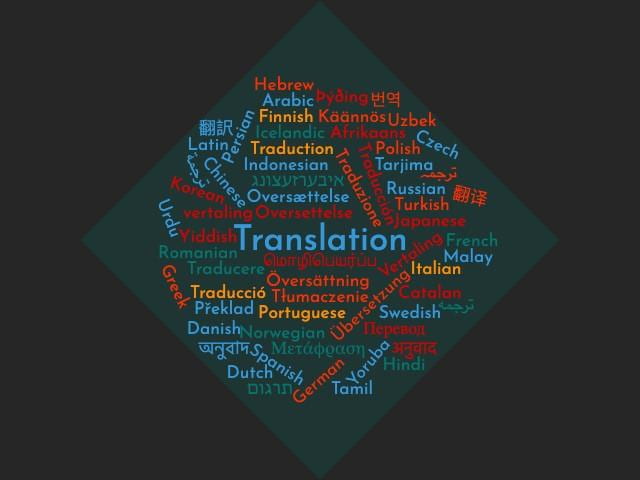
Brief Overview
The secondary field in Translation Studies offers students the opportunity to undertake a sustained study of the theory and practice of translation. More than simply examining how meaning is transferred from one language to another, translation studies opens up a space to examine linguistic encounter and exchange across languages, as well as across multiple cultures and disciplines. Students who pursue a secondary field in Translation Studies will root their translation work within language study, but they will be able to expand their engagement with the art and craft of translation to encompass questions raised by different genres, media, and disciplinary questions and practices.
Learning Objectives
Students who pursue a secondary field in Translation Studies will root their translation work within language study, but they will be able to expand their engagement with the art and craft of translation to encompass questions raised by different genres, media, and disciplinary questions and practices.
Gateway Courses
Students interested in exploring Translation Studies might consider the following:
- Foundational courses focusing on questions of translation theory and practice: Comp Lit 108: Translating World Literature; Comp Lit 109: On Translation; Freshman Seminar 36g: The Creative Work of Translation. Spanish 80t: Words of Which History is Made
- Upper-level language courses that highlight translation into and from a non-English language: Spanish 109: Displacing Spain: Translating Transatlantic Poetry on 20th– and 21st-Century Spain Translation Workshop on 20th-Century Spain; any 100-level course in Classics with the prefix Greek, Latin, or Modern Greek; Japan 106C: Later Classical Japanese.
- Courses that address issues of translation from other disciplinary perspectives: Comp Sci 181: Machine Learning; Linguistics 101: The Science of Language; Phil 147: Philosophy of Language
Concentration Advising Contacts
Sandra Naddaff
Director of Undergraduate Studies, Comparative Literature
snaddaff@fas.harvard.edu
Life Sciences
Biomedical Engineering

Brief Overview
Biomedical Engineering lies at the intersection of the physical and life sciences, incorporating principles from physics and chemistry to understand the operation of living systems. As in other engineering fields, the approach is highly quantitative: mathematical analysis and modeling are used to capture the function of systems from subcellular to organism scales. An education in Biomedical Engineering, and engineering more broadly, enables students to translate abstract hypothesis and scientific knowledge into working systems (e.g., prosthetic devices, imaging systems, and biopharmaceuticals). This enables one to both test the understanding of basic principles and to further this knowledge, and it places this understanding in the broader context of societal needs.
Learning Objectives
The overarching intellectual goal of biomedical engineering is to apply quantitative engineering analysis to understand the operation of living systems and design novel systems to satisfy unmet needs in medicine and industry. Specific objectives for students undertaking the A.B. in Biomedical Engineering are:
- Utilize mathematical analysis and modeling to capture the function of systems from subcellular to organism scales.
- Understand and apply the fundamental engineering disciplines (thermodynamics, fluid mechanics, kinetics); sciences (physics, biology, chemistry); and mathematics (statistics, differential equations) to solve biomedical problems.
- Translate scientific knowledge into working systems (e.g., prosthetic devices, imaging systems, and biopharmaceuticals).
- Gain depth of knowledge in chemical, biological, materials, and engineering science aspects of bioengineering.
Gateway Courses
- ENG-SCI 51 offered in Fall 2024 and Spring 2025
- ENG-SCI 53: Quantitative Physiology as a Basis for Engineering, Fall
- LS 1A: An Integrated Introduction to the Life Sciences, Fall (LPS A can also meet this requirement)
- Math, begin according to placement (Math Ma, Mb, 1a, b; or Math 21a, b)
- Physics (APPHY 50A: Physics as a Foundation for Science and Engineering, Part I (spring), b or Physical Sciences 2, 3 or Physical Sciences 12a, b or Physics 15a, b)
Concentration Advising Contacts
Professor Demba Ba
Director of Undergraduate Studies
demba@seas.harvard.edu
617-496-1228
Linsey Moyer (Study Abroad Contact)
Associate Director of Undergraduate Studies
lmoyer@seas.harvard.edu
617-496-2840
Sarah Colgan
Academic Programs Administrator
scolgan@seas.harvard.edu
617-496-1524
Chemical and Physical Biology
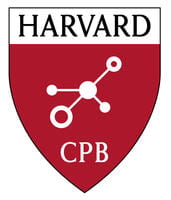
Brief Overview
Chemical and Physical Biology provides a link between classical approaches to studying biology and the chemical tools and physical methods required to understand dynamic changes in complex biological systems.
Learning Objectives
The Chemical and Physical Biology (CPB) concentration has several learning objectives, a few of which are listed below:
- Tackle biological problems using an integrated approach involving physical, chemical, quantitative, and computational skills
- Apply the scientific method to solve problems, both in and out of the lab
- Critically review scientific literature and evidence
Gateway Courses
First Year
- Math: Starting as recommended, up to Math 19A,B/Math 21A,B/Applied Math 21A,B or equivalent
- Chemistry: General chemistry PS1/PS10/PS11/CHEM 40
- CHEM 10: Quantum, Statistical and Computational Foundations of Chemistry (fall)
- Life sciences: either LS 1a (or LPSA) and LS 1b, or LS50
- PHYSCI 11: Foundations and Frontiers of Modern Chemistry (spring)
- CHEM 40: Inorganic Chemistry (spring)
Second Year
- MCB 60 and MCB 63/64/65/66/68/80
- Organic chemistry starting with CHEM 17/CHEM 20
Concentration Advising Contacts
Adam Cohen
Co-Head Tutor
cohen@chemistry.harvard.edu
Doeke Hekstra
Co-Head Tutor
doeke_hekstra@harvard.edu
Dominic Mao (Study Abroad Contact)
Assistant Director of Undergraduate Studies and Concentration Advisor
dominicmao@fas.harvard.edu
617-496-1206
Monique Brewster (Study Abroad Contact)
Associate Concentration Advisor
mbrewst@g.harvard.edu
617-496-6136
Claudia Galeas
Program Administrator
claudia_galeas@fas.harvard.edu
617-495-4106
Human Biology, Behavior, and Evolution

Brief Overview
The Human Biology, Behavior, and Evolution concentration (HBBE) is offered by the Department of Human Evolutionary Biology (HEB). The concentration explores all aspects of human biology and behavior from an evolutionary perspective. HBBE thus equips students with the knowledge and skills to explore fundamental questions about human nature, including how and why we became who we are, and why these questions matter in addressing real world problems. Research in HBBE offers valuable insights not only for medicine, exercise physiology, and diet, but also for fields such as economics, psychology, political science, religion, and literature.
Learning Objectives
Human Biology, Behavior, and Evolution (HBBE) provides a general foundation in human and organismic biology as part of the life sciences cluster of concentrations. All HBBE concentrators receive a core introduction to basic evolutionary biology as well as human and nonhuman primate genetics, physiology, anatomy, behavioral biology (including cultural evolution), and paleontology. HBBE courses also explore interactions between genes and environments and the co-evolution of genes and culture. We encourage our students to get involved in research in HBBE, and we offer many small, advanced courses for students to work intensively with members of the faculty.
Gateway Courses
- Gen Ed 1056: Human Nature
- GENED 1027: Human Evolution, Human Health, and Climate Change
- LIFESCI2: Evolutionary Human Physiology and Anatomy
- HEB 30: Primate Social Behavior
- HEB 39: The Human Brain in the Animal Kingdom
- HEB 45: Technology, Behavior and Human Evolution
- HEB 50: Human Metabolism
Concentration Advising Contacts
Chris Kuzawa
Director of Undergraduate Studies
ckuzawa@fas.harvard.edu
Dr. Andrew Yegian
Associate Dir of Undergraduate Studies & Concentration Advisor
ayegian@fas.harvard.edu
617-496-3809
Ashley Johnson
Undergraduate Program Coordinator
amjohnson@fas.harvard.edu
617-495-3399
Human Developmental and Regenerative Biology

Brief Overview
Human Developmental and Regenerative Biology (HDRB) is a life science concentration that educates students on how human beings develop from a fertilized egg, are maintained and repaired throughout adulthood, and age till life’s end. Students will be given a broad education in modern life sciences by studying important biological principles within the specific rubric of the developing and regenerating body. By adding an explicit and heavy emphasis on hands-on research opportunities in all four undergraduate years, HDRB will engage students with an interest in research and take advantage of Harvard’s special strengths as a teaching college and research university.
Learning Objectives
The HDRB concentration embraces ‘basic’ science.
Life science: Our students develop a profound understanding of human biology to gain a better understanding of disease, and apply what they learn in laboratory settings. They learn important biological principles that give insights into human biology, specifically in development and regeneration.
Foundational disciplines: We encourage our students to incorporate not only life science disciplines, but also chemistry, the physical sciences, and mathematics into their learning.
Research: The HDRB concentration emphasizes hands-on research, both through coursework and independent projects. Our students conduct experimental research in HSCRB laboratories throughout their undergraduate years, so they take full advantage of Harvard’s unique strengths as a teaching college and research university.
Translation: This foundation our students gain in human biology and the mechanisms of disease dovetails with some of the ‘translational’ research conducted in our labs, which is focused on clinical applications.
Gateway Courses
First Year
- Life sciences: LS1a (or LPSA) and LS1b, or LS50
- General chemistry: PS11 or equivalent
- Quantitative Reasoning: MATH1B or higher or STAT 100, STAT 102, or equivalent
Second Year
- Developmental Biology: SCRB 10
- Molecular Biology: SCRB 50
- Organic Chemistry: CHEM 17/27 or equivalent
Concentration Advising Contacts
Bill Anderson
Director of Undergraduate Studies
william_anderson@harvard.edu
617-495-0950
Amie Holmes (Study Abroad Contact)
Assistant Director of Undergraduate Studies
Concentration Advisor
amie_holmes@harvard.edu
617-496-1417
Integrative Biology
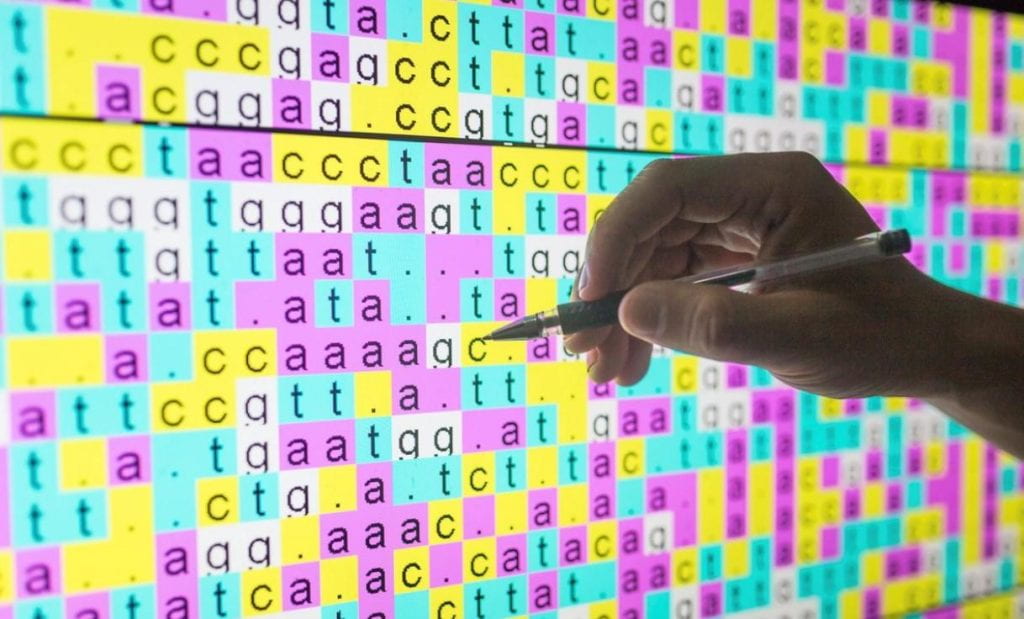
Brief Overview
Evolution is the strand that ties together all of biology: from the adaptive specifics of a membrane pore to grand events in the history of life, such as the Cambrian Explosion, when, 540 million years ago, life went in a single bound from simple to complex. Adaptive evolution is a response to the demands of the environment, whether this is the environment within a cell or an ecological community of interacting organisms. Integrative Biology (IB) therefore is inherently inter-disciplinary, encompassing mathematical and computational biology, functional and genetic approaches to morphology and development, as well as genetics, evolution, and ecology.
Learning Objectives
Courses emphasize student learning, critical thinking, and may include participation in research and field experiences, with the goal of fostering a foundation of knowledge and appetite for life-long learning, as students prepare for careers in the life sciences and related fields and professions.
Gateway Courses
- Life Sciences 1a or Life and Physical Sciences A or Life Sciences 50a (Fall)
- Life Sciences 1b or Life Sciences 50b (Spring)
- OEB 10 (Fall, typically sophomore year)
Concentration Advising Contacts
David Haig
Head Tutor
dhaig@oeb.harvard.edu
617-496-5125
Andrew Berry (Study Abroad Contact)
Assistant Head Tutor, Concentration Advisor, Secondary Field Contact
berry@oeb.harvard.edu
617-495-0684
James Poolner
Coordinator of Undergraduate Programs
jp@mcb.harvard.edu
617-495-3399
Microbial Sciences**
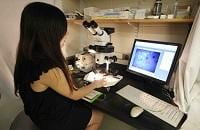
Brief Overview
Microbial sciences is an interdisciplinary approach to studying the impact of microbes at scales from global ecosystems down to single-celled microenvironments. The academic program emphasizes the joint study of species diversity, metabolic function, geochemical impact, and medical and pharmaceutical applications of microbial sciences. Faculty affiliated with the Microbial Sciences Initiative (MSI) include members from Molecular and Cellular Biology, Organismic and Evolutionary Biology, Earth and Planetary Sciences, Chemistry and Chemical Biology, the School of Engineering and Applied Sciences, Harvard Medical School, Harvard School of Public Health, and the Forsyth Institute.
Learning Objectives
The MSI secondary field is intended to provide a strong foundation in interdisciplinary microbial sciences to students who have sufficient preparation in other natural sciences, mathematics, or engineering. In particular, the MSI curriculum is intended to (i) be interdisciplinary, (ii) not be specifically biomedical, and (iii) incorporate elements from physical sciences as well as life sciences. An important aspect of the MSI secondary field is the laboratory component, which provides hands-on experiential learning to all students.
Gateway Courses
- LIFESCI 50A/50B
- LIFESCI 1A/1B
- FYSEM 24Q: Microbial Symbioses: From the Deep-Sea to the Human Microbiome
- FYSEM 50Q: Gut Reactions: Discovering Chemistry from the Human Microbiome
Concentration Advising Contacts
Contact MSI: MSI@fas.harvard.edu
Lila Witt
Scientific Program Manager
lilawitt@fas.harvard.edu
Dr. Peter Girguis
Head Tutor
pgirguis@oeb.harvard.edu
Mind, Brain, Behavior**

Brief Overview
Mind Brain Behavior (MBB) introduces students to the interdisciplinary study of the mind, the brain, and behavior. As a secondary field, it offers students the opportunity to confront the significant findings that have arisen from the traditional disciplines in the MBB area of inquiry and emphasizes the intellectual innovations that stem from crossing traditional disciplinary lines
Learning Objectives
Students will learn how past and current researchers have brought the perspectives of neuroscience into dialogue with those of other natural sciences, the social sciences, and the humanities, and will develop habits of interdisciplinary thinking themselves. In particular, the secondary field provides opportunities to learn about computational, neurobiological, evolutionary, psychological, linguistic, philosophical, and historical approaches and their interactions.
Gateway Course
We recommend that you take Psychology 1, Introduction to Psychological Science, in your first year. PSY 1 serves as an introduction to both psychology and mind/brain/ behavior and is also a requirement for the MBB secondary field. It is offered both semesters. If your schedule does not allow you to take PSY 1 until your sophomore year, that is usually fine.
Beyond coursework, you can learn about and take part in MBB in a variety of ways. Our website covers all things MBB. We also send monthly e-newsletters with information about upcoming events, program updates, and research opportunities. You can join our emailing lists on the front page of our website.
Undergraduates are very welcome to attend MBB public events, including talks by distinguished Harvard and visiting lecturers, as well as an annual symposium designed specifically for undergraduates. We also encourage you to participate in activities of the Harvard Society for Mind, Brain, and Behavior (HSMBB), a very active undergraduate organization that hosts talks, informal conversations, and symposiums with faculty and researchers from a wide range of MBB areas. The HSMBB website is hsmbb.org, its Facebook page is http://facebook.com/HSMBB, and you can join its email list at lists.hcs.harvard.edu/mailman/listinfo/hsmbb-list.
Concentration Advising Contacts
Shawn Harriman
Education Program Coordinator
shawn_harriman@harvard.edu
Molecular and Cellular Biology
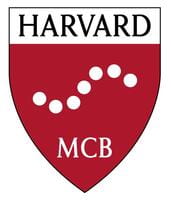
Brief Overview
Molecular and Cellular Biology is rooted in the investigation of biological processes based on the study of molecules and their interactions in the context of cells and tissues, and how the genome orchestrates cell behavior.
Learning Objectives
The Molecular and Cellular Biology (MCB) concentration has several learning objectives, a few of which are listed below:
- Investigate biological processes at the level of cells and molecules
- Apply the scientific method to solve problems, both in and out of the lab
- Critically review scientific literature and evidence
Gateway Courses
First Year
- Math: Starting as recommended, up to Math 19A,B/Math 21A,B/Applied Math 21A,B or equivalent
- Chemistry: General chemistry PS1/PS10/PS11/CHEM 40
- Life sciences: either LS 1a (or LPSA) and LS 1b, or LS50
- CHEM 10: Quantum, Statistical and Computational Foundations of Chemistry (fall)
Math according to placement; LIFESCI 50A and B may replace LS1A-B
Second Year
- MCB 60 and MCB 63/64/65/66/68/80
- Organic chemistry starting with CHEM 17/CHEM 20
Concentration Advising Contacts
Sam Kunes
Head Tutor
kunes@fas.harvard.edu
617-496-3806
Dominic Mao (Study Abroad Contact)
Assistant Director of Undergraduate Studies and Concentration Advisor
dominicmao@fas.harvard.edu
617-496-1206
Monique Brewster (Study Abroad Contact)
Associate Concentration Advisor
mbrewst@g.harvard.edu
617-496-6136
Claudia Galeas
Program Administrator
claudia_galeas@fas.harvard.edu
617-495-4106
Neuroscience
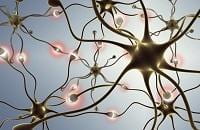
Brief Overview
Neuroscientists explore what is arguably the least understood and most important area of biology: how billions of electrically charged neurons create our rich sensory, emotional, and intellectual life (and no less than all animal behavior!). Neuroscience as a field is interdisciplinary and encompasses many areas of science, including genetics, chemistry, molecular biology, mathematics, cell and systems biology, computer science, and cognitive science. Neuroscientists study every aspect of the brain – from genes to behavior. As such, when you become a neuroscience student you will get broad training as a biologist as well as a new perspective on what it means to be a human.
Learning Objectives
The Neuroscience curriculum includes a series of fundamental courses in the life and applied sciences. In advanced elective courses, students explore specific areas of neuroscience on a range of topics including cells and circuits, physiology, learning and memory, cognitive science, development, genetics, computational modeling, and disease and therapeutics. Students have many opportunities for hands-on laboratory experience and independent research projects to complement and deepen their studies.
Gateway Courses
First Year
Neurobiology and MBB tracks:
- LS1a, LPS A, or LS 50a (fall)
- Ls1b or LS 50b (spring)
- Math 1a (equivalent or above), Statistics, and/or a ‘related fields’ course (either semester)
Computational Neuro track:
- CS 32, CS 50, or APMTH 10
- CS 51 or 61
- Math 21A and B (or equivalent)
Second Year
- Neuro 80. Neurobiology of Behavior (fall)
- One of the ‘Foundational Courses’: Neuro 57 (Behavior), 105 (Circuits), 115 (Neurophysiology), 120 (Computational), or 125 (Molecular)
Concentration Advising Contacts
Nao Uchida, Head Tutor
uchida@mcb.harvard.edu
617-496-8943
Ryan Draft (Study Abroad Contact)
Assistant Director of Undergraduate Studies, Secondary Field Contact
draft@fas.harvard.edu
617-496-9908
Kristina Penikis
Associate Concentration Advisor
kpenikis@fas.harvard.edu
Laura Magnotti (Study Abroad Contact)
Assistant Director of Undergraduate Studies in Neuroscience
magnotti@fas.harvard.edu
617-496-2432
Psychology

Brief Overview
Psychology is the scientific study of the mind, and as such, we investigate the minds of humans and other species. We try to understand the mind at many different levels of analysis, from taking measurements from the brain, through learning about the individual, all the way to understanding groups and organizations. Most of the research conducted in Harvard’s Department of Psychology concerns basic psychological processes such as attention, perception, memory, categorization, reasoning, decision-making, language, cognitive and social development, social cognition, intergroup relations, and morality. In addition, some members of the department conduct research on the etiology, development, and treatment of psychopathology. All members of the department share the common goal of understanding mind, brain, and behavior through empirical investigation, and their teaching and research reflect this goal.
Learning Objectives
The primary goal of the Psychology concentration is to provide students with a fundamental understanding of the human mind. In the process of doing so, other goals will also be achieved: the skill to critically assess quantitative evidence from experimental and correlational data, to learn to take difficult and previously unstudied problems of mind and society and bring them under experimental scrutiny, to learn to speak and write about questions of great theoretical and social importance that involve the mind.
Gateway Courses
Psychology requires course completion in the following order:
First, take:
- PSY 1: Introduction to Psychological Science (formerly SLS 20, offered fall and spring) is a prerequisite for the majority of psychology courses and required for the concentration or secondary field. You may be able to count a Psychology AP score of 5 or IB score of 7 towards the Introductory course requirement. Please contact the Psychology Undergraduate Office at psychology@wjh.harvard.edu to learn more.
- PSY 1900: Introduction to Statistics for the Behavioral Sciences (offered fall and spring) is required by the end of sophomore year. It can be taken prior to or concurrently with PSY 1.
Then, take two of the following Foundational Courses (see track-specific requirements).
- Psychology 11: Cognition: How the Mind Works
- Psychology 14: Cognitive Neuroscience
- Psychology 15: Social Psychology
- Psychology 16: Developmental Psychology
- Psychology 18: Psychopathology
Concentration Advising Contacts
Send general inquiries to psychology@wjh.harvard.edu
Katie Powers (Study Abroad Contact)
Associate Director of Undergraduate Studies
kpowers@fas.harvard.edu
Jill Hooley
Director of Undergraduate Studies
jmh@wjh.harvard.edu
Correna Cohen
Undergraduate Program Coordinator
correna_cohen@fas.harvard.edu
Math & Computation
Applied Math
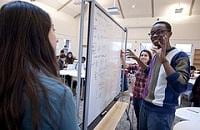
Brief Description
Applied mathematics represents a quantitative liberal arts degree. The degree provides the opportunity for combining mathematical thinking with any subject for which mathematics can be productively applied.
In some instances, combining applied mathematics with a particular subject can lead to a program of study that is quite similar to studying that subject itself. For example, applied mathematics with physics as an application area is quite similar to studying physics. On the other hand, there are other instances (combining applied mathematics with psychology or government) where the degree program would be quite different.
Learning Objectives
For concentrators, a core learning objective is building and demonstrating foundational knowledge in computation, probability, discrete, and continuous mathematics. This happens through the successful completion of the foundation and breadth courses. In addition, through their coursework, concentrators should gain facility and comfort in using approximation to simplify problems and gain insight. They should learn to communicate effectively with fellow technical professionals and should be prepared, by their senior year, to tackle mathematical modeling problems in their area of application, at the level of a senior thesis.
Gateway Courses
- Math Ma and Mb or 1a
- Math 1b
- APMTH 10: Computing with Python for Scientists and Engineers
- APMTH 50
- Math 21a/Math 21b
- Math 22a/Math 22b
- APMTH22a/APMTH22b
Contact Us
Dr. Margo Levine (Study Abroad Contact)
Co-Director of Undergraduate Studies
Eli Tziperman
Co-Director of Undergraduate Studies
Dr. Sarah Iams
Co-Director of Undergraduate Studies
am-advising@seas.harvard.edu
Computer Science
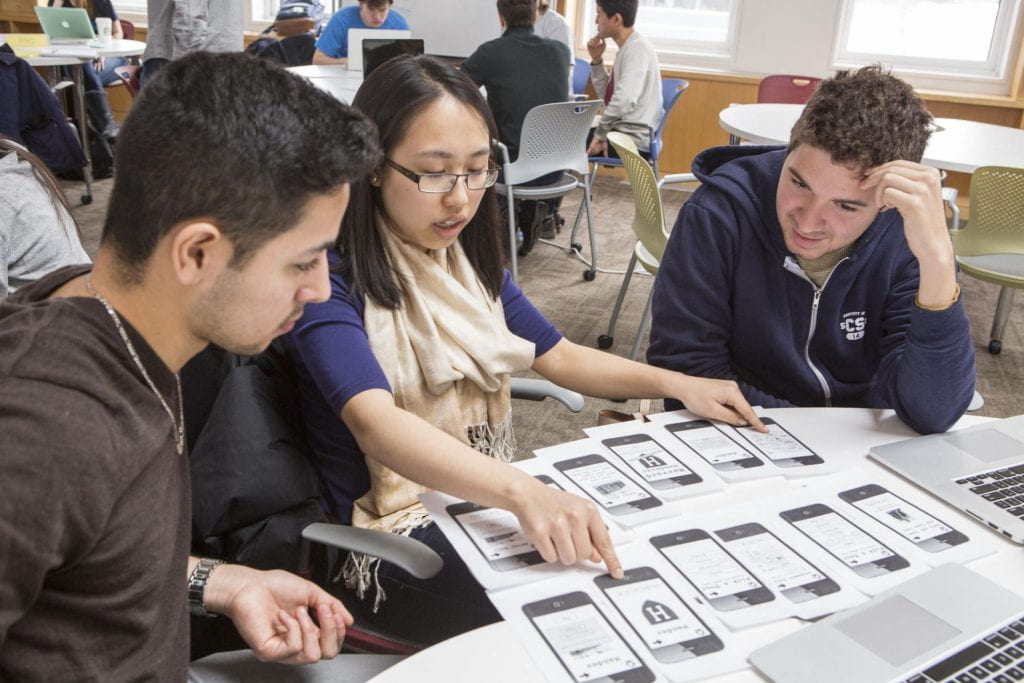
Brief Overview
Computer science is about tools and technology, and also about understanding and engaging with the world. From swarms of insects to elementary particles, rational agents in a market, and neurons in a brain, the computational viewpoint has proven a fruitful way to understand natural, social, and engineered systems. Correspondingly, the Computer Science concentration has strong ties not just to engineering, but also economics, law, biology, physics, statistics, mathematics, linguistics, and more. Because information technology affects every aspect of society, graduates with computer science degrees have access to a large variety of careers, including engineering, teaching, medicine, law, basic science, finance, and management.
Learning Objectives
The Computer Science concentration has the following learning outcomes for our graduates: students will design and code correct solutions to problems; design and reason about algorithms; and develop and analyze the ways computation interacts with other systems.
Gateway Courses
More information available on our First-Year Exploration page.
- CS 32: CS 32: Computational Thinking and Problem Solving (spring). Open to all, no prerequisites. Best to take this course first year. This course is appropriate for students who could not take CS 50 in the Fall term or who want a different introduction to Computer Science.
- CS 50: Introduction to Computer Science I (fall and spring). The spring offering has limited enrollment. Open to all, no prerequisites. Best to take this course first year, though it is possible to take it in sophomore fall and still complete any of the concentration tracks.
- CS 51: Abstraction and Design in Computation (usually taken after CS 50)
- CS 61: Systems Programming and Machine Organization (fall). For those who have the prerequisite C programming experience.
- CS 20: Discrete Mathematics for Computer Science (spring). A spring term course to prepare students for courses in theoretical computer science such as CS 1200, CS 1210, and 1240.
- CS 1200 Introduction to Algorithms and Their Limitations (fall). For those who have the prerequisite background in formal mathematics.
- CS 1210: Introduction to the Theory of Computation (fall). For those who have the prerequisite background in formal mathematics.
- Computer Science ordinarily requires mathematics as follows: Linear Algebra to the level of Mathematics 21b or equivalent; and Probability to the level of Statistics 110 or equivalent. Students should follow Mathematics placement advice in judging where to start in the Mathematics sequence.
Concentration Advising Contacts
Professor Eddie Kohler
Co-Director of Undergraduate Studies
Professor Stephen Chong
Co-Director of Undergraduate Studies
Adam Hesterberg (Study Abroad Contact)
Assistant Director of Undergraduate Studies
cs-dus@seas.harvard.edu
Beth Musser
Undergraduate Program Coordinator
cs-dus@seas.harvard.edu
Advising office hours: https://csadvising.seas.harvard.edu/contact/
Mathematics

Brief Overview
Mathematics is the science of order, and mathematicians seek to identify instances of order and to find notions and tools to perceive order where it is a priori hidden from view. Perhaps the most important concept of mathematics is that of function, which provides us with the means to study dependence and change. The study of real functions of a real variable (and later complex functions), particularly in connection with the limit concept, is called analysis. The most effective tool for this study is the infinitesimal calculus that analyzes the relation between functions and their derivatives. Then there are the notions and tools for the study of number systems and their generalizations; these form the branch of mathematics called algebra. Here the primary concepts are group, ring, field, and module. A third over-arching set of notions and tools concerns geometry, which now goes far beyond the classical study of the space we live in to include spaces of high dimension and the properties of classical and very non-classical notions of space (which is, in part, the subject of what is called topology).
Learning Objectives
The concentration in Mathematics is designed to acquaint the student with the most important general concepts underlying the three over-arching areas of mathematics; analysis, algebra and geometry. Concentration in mathematics will provide an adequate basis for further study in either pure or applied mathematics.
Gateway Courses
First year potential concentrators should enroll in a math course at the appropriate level. This will determine which course should be considered. For almost all, it will be one of:
- Math Qa and Qb: Quantitative Analysis for Economics and the Social Sciences
- Math Ma and Mb: Introduction to Functions and Calculus
- Math 1a: Introduction to Calculus (Offered both semesters.)
- Math 1b: Calculus, Series and Differential Equations (Offered both semesters.)
- Mathematics 21a: Multivariable Calculus (Offered both semesters.)
- Math 21b: Linear Algebra and Differential Equations (Offered both semesters.)
- Mathematics 22a and 22b: Vector calculus and Linear Algebra with Introduction to Proof.
- Mathematics 25a and 25b: Theoretical Linear Algebra and Real Analysis I and II (fall and spring)
- Math 55a and 55b: Studies in Algebra and Group Theory (55a), Studies in Real and Complex Analysis (55b)
- Math 101: Sets, Groups and Topology (Offered both fall and spring)
Students thinking to enroll in other Math courses should talk to a Math Department advisor to determine if more is needed by way of background (for example, the Math Department’s Director or Assistant Director of Undergraduate Studies). See the Math Department concentration information web page for more about concentrating in mathematics.
Concentration Advising Contacts
Cliff Taubes (Study Abroad Contact)
Director of Undergraduate Studies
chtaubes@math.harvard.edu
617-495-5579
Wes Cain
Assistant Director of Undergraduate Studies
jcain2@math.harvard.edu
617-495-1790
Cindy Jimenez
Undergraduate Program Coordinator
cindy@math.harvard.edu
617-495-9116
Statistics

Brief Overview
Statistics is a relatively young discipline, organized around the rapidly growing body of knowledge about principled methods for data collection and data analysis, the making of rational decisions under uncertainty, and the modeling of randomness in any quantitative inquiries, including the social, natural, and medical sciences. Statistics has a theoretical core surrounded by a large number of domains of application in fields such as anthropology, astronomy, biology, business, chemistry, computer science, economics, education, engineering, environmental sciences, epidemiology, finance, forensic science, geophysical sciences, government, history, law, linguistics, mathematics, medicine, physics, population science, psychology, sociology, and many others.
Learning Objectives
A basic goal of the concentration in Statistics is to help students acquire the conceptual, computational, and mathematical tools for quantifying uncertainty and making sense of complex data arising from many applications.
Gateway Courses
- Statistics 100: Introduction to Statistics and Data Science (fall and spring)
- Statistics 102: Introduction to Statistics for Life Sciences (spring)
- Statistics 104: Introduction to Quantitative Methods for Economics (fall and spring)
- Only one of Stat 100, 102, or 104 can be taken for credit
- Statistics 110: Introduction to Probability (fall)
- Statistics 111: Introduction to Theoretical Statistics (spring)
- Statistics 139: Statistical Sleuthing Through Linear Models (fall)
It is highly recommended to take Stat 110, 111, and 139 sequentially and in numerical order.
Concentration Advising Contacts
Joseph Blitzstein
co-Director of Undergraduate Studies
blitz@fas.harvard.edu
617-496-2985
Kelly McConville
co-Director of Undergraduate Studies
kmcconville@fas.harvard.edu
617-496-1824
https://statistics.fas.harvard.edu/people/kelly-mcconville
Kevin Rader
Associate Director of Undergraduate Studies
krader@fas.harvard.edu
617-495-5204
Lorna Blocksma (Study Abroad Contact)
Undergraduate Student Program Administrator
lblocksma@fas.harvard.edu
617-495-1184
Physical Sciences
Astrophysics

Brief Overview
The science of astrophysics involves the study of matter and radiation in the universe as understood through the laws of physics. Astronomical phenomena exhibit an extreme range of physical conditions, from superfluid neutrons in neutron stars, high-temperature nuclear reactions in supernovae, and strong gravitational fields near black holes, to the unique state of the universe during its earliest phases. Theoretical attempts to describe these and more familiar phenomena (such as stars and galaxies) have achieved a useful understanding in many cases. However, our overall knowledge of the universe is still woefully incomplete, and our contemporary physical knowledge is often stretched to its limits in attempting to understand physical conditions that cannot be reproduced in terrestrial laboratories.
Learning Objectives
The concentration in Astrophysics introduces students to a broad range of phenomena through a program of both observational and theoretical courses. This program builds from a foundation of modern physics to a general account of the known contents of the universe.
Gateway Courses
- ASTRON 1: The Big Questions of Astronomy
- Astronomy 16: Stellar and Planetary Astronomy; spring
- Astronomy 17: Galactic and Extragalactic Astronomy; fall
- Astronomy 16 and 17 may be taken in either order; whichever is taken first, must be preceded or taken concurrently with one introductory course in Mechanics
- ASTRON 22: The Unity of Science: From the Big Bang to the Brontosaurus and Beyond
- Physics 15a: Introductory Mechanics and Relativity; fall and spring
- Physics 16: Mechanics and Special Relativity; fall
- Physical Sciences 12a: Mechanics from an Analytic, Numerical, and Experimental Perspective; spring
- Mathematics or Applied Mathematics 21a, 23a, 25a
Concentration Advising Contacts
Andrew Vanderburg
Director of Undergraduate Studies
andrew.vanderburg.astro@gmail.com
Peg Herlihy
Department Administrator
pherlihy@cfa.harvard.edu
617-495-3753
Chemistry

Brief Overview
Chemistry is the science of the structure, properties, and reactions of matter. It is both a basic science, fundamental to an understanding of the world we live in, and a practical science with an enormous number and variety of important applications. Knowledge of chemistry is fundamental to an understanding of biology and biochemistry and of certain aspects of geology, astronomy, physics, and engineering.
Learning Objectives
Students graduating with a degree in chemistry will gain skills in a range of areas from reading scientific papers to conducting experiments safely and ethically to learning how to identify and propose solutions to problems that are novel and important. Because research is a foundation for the study of chemistry we believe that all students in the concentration should participate in an authentic research experience by the end of their senior year.
Gateway Courses
First-year students should enroll in one introductory chemistry course in the fall and one in the spring.
There will be an online joint open house held in the summer to allow first-year students to explore the following three courses (information on how to join the open house will be provided on each course’s Canvas site).
These are the fall courses to choose from:
- Life and Physical Sciences A (LPS A): Foundational Chemistry and Biology; fall
- Life Sciences 1a (LS 1a): An Integrated Introduction to the Life Sciences – Chemistry, Molecular Biology, and Cell Biology; fall
- Chemistry 10 (Chem 10): Quantum, Statistical, and Computational Foundations of Chemistry; fall. Chem 10 fulfills two semesters of general chemistry for the chemistry concentration. Students may not count both Chem 10 and PS11 for degree credit.
These are the spring courses to choose from:
- Physical Sciences 11 (PS11): Foundations and Frontiers of Modern Chemistry – A Molecular and Global Perspective; spring
- Chemistry 20 (Chem 20): Organic Chemistry; spring
Concentration Advising Contacts
Greg Tucci
Director of Undergraduate Studies, Concentration Advisor
tucci@fas.harvard.edu; chemistrydus@fas.harvard.edu
617-496-4668
Lu Wang
Assistant Director of Undergraduate Studies, Concentration Advisor
wang29@fas.harvard.edu; chemistrydus@fas.harvard.edu
Chemistry and Physics

Brief Overview
There is exciting science on the somewhat arbitrary and fluid boundary between chemistry and physics. Chemists and physicists often study the same phenomena in slightly different ways, and it is very useful, in the boundary area, to have training in both fields. Recognizing this, the physics department has for many years offered the concentration in Chemistry and Physics.
Learning Objectives
The Chemistry & Physics concentration is structured to assure that all concentrators are introduced to the core subjects of chemistry (organic, inorganic, and physical); of physics (mechanics, electromagnetism, waves, and quantum theory); and of mathematics.
Gateway Courses
- Life Sciences 1a (LS 1a) or Physical Sciences 1 (PS1) is useful as a general introduction to Chemistry.
- Physical Sciences 10 (PS10) is strongly recommended for students interested in the Chemistry and Physics concentration because it combines statistical mechanics and quantum mechanics, two of the most important topics in physics and chemistry, at an accessible level.
- CHEM 10: Quantum, Statistical and Computational Foundations of Chemistry (fall)
- Most Chemistry and Physics students will begin their physics program with mechanics in Physics 15a or 16 or 19, and continue with Physics 15b and c. However, it is also possible to get started by taking Physical Sciences 12a/b or AP50a/b. Students in these courses who are interested in the Chemistry and Physics concentration should consult the Director or Co-Director of Undergraduate Studies, who will work with them to design an appropriate plan of study.
- Mathematics is an indispensable tool in chemistry and physics, and students will find it very useful to improve their math skills early in their academic careers, by taking two courses at the Math 21 level, along with any needed prerequisites.
Concentration Advising Contacts
Dr. Sonia Paban
Director of Undergraduate Studies for Physics
sppaban@fas.harvard.edu
617-384-0518, Jefferson 569
Dr. Anna Klales
Associate Director of Undergraduate Studies for Physics
aklales@g.harvard.edu
Lyman 238
Dionne Clarke
Undergraduate Program Administrator for Physics
dlclarke@fas.harvard.edu
617-384-6578, Jefferson 241
Greg Tucci
Director of Undergraduate Studies for Chemistry, Concentration Advisor
tucci@fas.harvard.edu; chemistrydus@fas.harvard.edu
617-496-4668
Lu Wang
Assistant Director of Undergraduate Studies for Chemistry, Concentration Advisor
wang29@fas.harvard.edu; chemistrydus@fas.harvard.edu
Earth and Planetary Sciences

Brief Overview
The Earth and Planetary Sciences department is focused on critical events that have shaped the Earth’s evolution and its place in the solar system. Our approach is to apply interdisciplinary tools to investigate processes from tectonic plate to microbial scale, and across the full sweep of geological time, from the early Earth to the modern world. Using a combination of theoretical, computational, laboratory, and field-based methods, we study natural experiments in Earth’s history, and ultimately test the limits of the Earth’s resilience in the geological past and in our progressively warming world.
Learning Objectives
Because the Earth’s natural systems are interconnected, the training of Earth and planetary scientists broadly spans biology, chemistry, engineering, physics, mathematics, and the Earth sciences themselves, and provides a wide range of intellectual foundation that is beyond what is typically possible in a “pure” science program.
Gateway Courses
- EPS/ESE 6: Introduction to Environmental Science and Engineering
- EPS 10: A Brief History of the Earth
- E-PSCI 50: The Fluid Earth: Oceans, Atmosphere, Climate, and Environment
- E-PSCI 54: Minerals and Rocks of the Earth and Planets
- GENED 1018: How to Build a Habitable Planet
- GENED 1085: Energy Resources and the Environment
- GENED 1094: Confronting Climate Change: A Foundation in Science, Technology, and Politics
- GENED 1098: Natural Disasters
- GENED 1137: The Challenge of Human-Induced Climate Change: Transitioning to a Post-Fossil Fuel Future
- GENED 1158: Water and the Environment
- GENED 1167: Climate Crossroads
- GENED 1184: Worlds Beyond: The Past, Present, and Future of Solar System Exploration
Concentration Advising Contacts
Roger Fu
Co-Director of Undergraduate Studies
rogerfu@fas.harvard.edu
Robin Wordsworth
Co-Director of Undergraduate Studies
rwordsworth@seas.harvard.edu
Campbell Halligan
Academic Programs Manager
campbellhalligan@fas.harvard.edu
Energy and the Environment**

Brief Overview
The energy-environment challenge is a defining issue of our time, and one of Harvard’s greatest contributions to meeting that challenge will be the education of a new generation of leaders in science, business, law, design, and public service. To this end, the Environmental Science and Public Policy (ESPP) program, in coordination with the Harvard University Center for the Environment (HUCE), is pleased to offer the secondary field in Energy and Environment (E&E). Through coursework and a colloquium, students engaged in the E&E secondary field will increase their exposure to, and literacy in, the interdisciplinary nature of issues related to energy and the environment.
Learning Objectives
All participating students share exposure to the core issues related to climate change, the consequences of energy choices, and changes in our physical and biological environment, preparing them to make informed professional and personal decisions about some of the most pressing societal challenges of the 21st century.
Gateway Courses
Introductory Courses (one required):
EPS 50: The Fluid Earth: Oceans, Atmosphere, Climate, and Environment (spring)
E-PSCI 6: Introduction to Environmental Science and Engineering (fall; concurrent or pre-req Math 1B)
GE 1158: Water and the Environment (spring)
[ GE 1094: The Climate-Energy Challenge ]
[ GE 1085: Energy Resources and the Environment ]
Concentration Advising Contacts
Dr. Diana Sharpe
Associate Director of Undergraduate Studies
617-496-0746
diana_sharpe@fas.harvard.edu
Professor Paul Moorcroft (Fall)
Professor Stephen Ansolabehere (Spring)
Head Tutor
espp@fas.harvard.edu
617-496-6995
Lorraine Maffeo
Program Administrator and Student Services Officer
maffeo@fas.harvard.edu
Environmental Science and Public Policy

Brief Overview
The concentration in Environmental Science and Public Policy (ESPP) is designed to provide a multidisciplinary introduction to current problems of the environment. It is founded on the premise that the ability to form rational judgments concerning many of the complex challenges confronting society today involving the environment requires both an understanding of the underlying scientific and technical issues and an appreciation for the relevant economic, political, legal, historical, and ethical dimensions. Depending on preparation, students may be encouraged to substitute more advanced courses for these requirements. In consultation with their concentration advisor, Through their field of specialization, students develop expertise in a particular field of study relating to the environment.
Learning Objectives
All students satisfy a core of requirements in the physical, biological, and social sciences and mathematics. Students also develop an individual plan of study for a series of advanced courses around a particular field of specialization. Through their field of specialization, students develop expertise in a particular field of study relating to the environment.
Gateway Courses
Introductory Courses (one required):
- EPS 50: The Fluid Earth: Oceans, Atmosphere, Climate, and Environment (spring)
- E-PSCI 6: Introduction to Environmental Science and Engineering (fall; concurrent or pre-req Math 1B)
- GE 1158: Water and the Environment (spring)
- [ GE 1094: The Climate-Energy Challenge ]
- [ GE 1085: Energy Resources and the Environment ]
Additionally, students are encouraged to take math and chemistry in their first year.
Concentration Advising Contacts
Dr. Diana Sharpe
Associate Director of Undergraduate Studies
617-496-0746
diana_sharpe@fas.harvard.edu
Professor Paul Moorcroft (Fall)
Professor Stephen Ansolabehere (Spring)
Head Tutor
espp@fas.harvard.edu
617-496-6995
Lorraine Maffeo
Undergraduate Program Administrator and Student Services Officer
maffeo@fas.harvard.edu
617-496-6995
Mathematics

Brief Overview
Mathematics is the science of order, and mathematicians seek to identify instances of order and to find notions and tools to perceive order where it is a priori hidden from view. Perhaps the most important concept of mathematics is that of function, which provides us with the means to study dependence and change. The study of real functions of a real variable (and later complex functions), particularly in connection with the limit concept, is called analysis. The most effective tool for this study is the infinitesimal calculus that analyzes the relation between functions and their derivatives. Then there are the notions and tools for the study of number systems and their generalizations; these form the branch of mathematics called algebra. Here the primary concepts are group, ring, field, and module. A third over-arching set of notions and tools concerns geometry, which now goes far beyond the classical study of the space we live in to include spaces of high dimension and the properties of classical and very non-classical notions of space (which is, in part, the subject of what is called topology).
Learning Objectives
The concentration in Mathematics is designed to acquaint the student with the most important general concepts underlying the three over-arching areas of mathematics; analysis, algebra and geometry. Concentration in mathematics will provide an adequate basis for further study in either pure or applied mathematics.
Gateway Courses
First year potential concentrators should enroll in a math course at the appropriate level. This will determine which course should be considered. For almost all, it will be one of:
- Math Qa and Qb: Quantitative Analysis for Economics and the Social Sciences
- Math Ma and Mb: Introduction to Functions and Calculus
- Math 1a: Introduction to Calculus (Offered both semesters.)
- Math 1b: Calculus, Series and Differential Equations (Offered both semesters.)
- Mathematics 21a: Multivariable Calculus (Offered both semesters.)
- Math 21b: Linear Algebra and Differential Equations (Offered both semesters.)
- Mathematics 22a and 22b: Vector calculus and Linear Algebra with Introduction to Proof.
- Mathematics 25a and 25b: Theoretical Linear Algebra and Real Analysis I and II (fall and spring)
- Math 55a and 55b: Studies in Algebra and Group Theory (55a), Studies in Real and Complex Analysis (55b)
- Math 101: Sets, Groups and Topology (Offered both fall and spring)
Students thinking to enroll in other Math courses should talk to a Math Department advisor to determine if more is needed by way of background (for example, the Math Department’s Director or Assistant Director of Undergraduate Studies). See the Math Department concentration information web page for more about concentrating in mathematics.
Concentration Advising Contacts
Cliff Taubes (Study Abroad Contact)
Director of Undergraduate Studies
chtaubes@math.harvard.edu
617-495-5579
Wes Cain
Assistant Director of Undergraduate Studies
jcain2@math.harvard.edu
617-495-1790
Physics

Brief Overview
The concentration in Physics serves a variety of goals and interests. Many concentrators seek an understanding of the subtle, profound, and fundamental laws—relativity, quantum mechanics, and the basic force laws—that govern the behavior of all matter. Often these studies involve the smallest units of matter: molecules, atoms, nuclei, and sub-nuclear particles. A major interest of other Physics concentrators is the exploration and explanation of the diverse properties to which these laws give rise in macroscopic systems such as fluids and solids. Still others study aspects of more complex systems like oceans and atmospheres, stars, and living matter.
Learning Objectives
A concentration in Physics provides a foundation for subsequent professional work in physics, and also for work in computer science, astronomy, biophysics, chemical physics, engineering and applied physics, earth and planetary sciences, geology, astrophysics, and the history and philosophy of science. Less obviously perhaps, the intellectual attitudes in physics — blending imagination, prediction, observation, and deduction — provide an excellent base for subsequent graduate work in professional schools of medicine, education, law, business, and public administration.
Gateway Courses
Fall 2024
- Physics 15a: Introductory Mechanics and Relativity (through Math 1b req, 21a recommended)
- Physics 19: Introduction to Theoretical Physics (math 1a recommended but not required)
Spring 2025
- Physics 15a: Introductory Mechanics and Relativity (though Math 1b req, 21a recommended)
- Math according to placement, Physics 16: Mechanics and Special Relativity (math 21a at a minimum required; AP physics C 5); PS 10
- Most Physics students will begin their physics program with mechanics, in Physics 15a or 16 or 19, and continue with Physics 15b and c. However, it is also possible to get started by taking Physical Sciences 12a/b or Applied Physics 50a/b. Students in these courses who are interested in the Physics concentration should consult the Director or Co-Director of Undergraduate Studies, who will work with them to design an appropriate plan of study.
- Mathematics is an indispensable tool in physics, and students will find it very useful to improve their math skills early in their academic careers, by taking two courses at the Math 21 level, along with any needed prerequisites.
- In some subfields of physics (condensed matter, for example), the study of chemistry is very important. And almost all physics students will find it useful to dip into chemistry to see how this neighboring science approaches similar problems. We strongly recommend Physical Sciences 10 (which counts as a physics course for the concentration) because it combines statistical mechanics and quantum mechanics, two of the most important topics in physics and chemistry, at an accessible level.
Concentration Advising Contacts
Dr. Sonia Paban
Director of Undergraduate Studies for Physics
sppaban@fas.harvard.edu
617-384-0518, Jefferson 569
Dionne Clarke
Undergraduate Program Administrator for Physics
dlclarke@fas.harvard.edu
(617) 384-6578, Jefferson 241
Dr. Anna Klales
Associate Director of Undergraduate Studies for Physics
aklales@g.harvard.edu
Lyman 238
Qualitative Social Sciences
African and African American Studies

Brief Overview
The Department of African and African American Studies brings together scholars and scholarship from many disciplines to explore the histories, societies, and cultures of African and African-descended people. The field of African and African American Studies is not only interdisciplinary but also comparative and cross-cultural.
Learning Objectives
Students who graduate with a concentration in African and African American Studies develop a powerful skillset of creative, analytical, integrative, problem-solving perspectives that equip them for leadership in many fields.
Gateway Courses
- AFRAMER 10: Introduction to African American Studies
- AFRAMER 11: Introduction to African Studies
- AFRAMER 12: Introduction to Afro-Latin American Studies
- AFRAMER 97: Sophomore Tutorial
- GEN ED 1071: African Spirituality and the Challenges of Modern Times
- GEN ED 1103: Living in an Urban Planet
- GEN ED 1052: Race in a Polarized America
- GEN ED 1113: Race, Gender, and Performance
- GEN ED 1133: Is the U.S. Civil War Still Being Fought?
As of 2025, offering three concentration tracks:
African Studies
African American Studies
Afro-Latin American and Caribbean Studies
Concentration Advising Contacts
Carla Martin
Assistant Director of Undergraduate Studies
cdmartin@fas.harvard.edu
617-495-4113
Bojana Coulibaly
Harvard African Program Manager
bojana_coulibaly@fas.harvard.edu
Jesse McCarthy
Director of Undergraduate Studies
jessemccarthy@fas.harvard.edu
617-496-6155
Keirsten Melbourne
Graduate & Undergraduate Coordinator
keirsten_melbourne@fas.harvard.edu
John Mugane (Study Abroad Contact)
Language Faculty Advisor for Study Abroad
mugane@fas.harvard.edu
617-496-4995
Jacob Olupona
Department Chair
olupona@fas.harvard.edu
Anthropology

Brief Overview
Anthropology is the study of human diversity in the distant past and the present and teaches us to recognize the remarkable array of circumstances in which human beings live their lives and make meaning from them.
Learning Objectives
The study of anthropology prepares students to address global concerns through a contextualized study of society, culture and civilization, and can lead to careers in global health and medicine, law, government, museums, education, the arts, cultural and environmental management, business and entrepreneurship, among other fields, not to mention academia.
Gateway Courses
Archaeology
- Gened 1044: Deep History
- Gened 1105: Can We Know Our Past?
- Gened 1099: Pyramid Schemes: What Can Ancient Egyptian Civilizations Teach Us?
- Freshman Seminar 30g: Digging Egypt’s Past. Harvard and Egyptian Archaeology
- Freshman Seminar 44j: Clash of the Titans, Seats of the Empire: The Aztecs, Toltecs and Race of the Giants in Ancient Mexico
- ANTHRO 1602: Intro to Sociocultural Anthropology
- Anthro 1038: Game of Stones: The Archaeology of Europe from Handaxes to Stonehenge (not offered 2024-2025)
- Anthro 1130: Archaeology of Harvard Yard
- Anthro 1190: American Invasions: Archaeological Tales of Encounter, Exploration, and Colonization, 1492-1830
- Anthro 1250: The Pyramids of Giza: Technology, Archaeology, History
Social Anthropology
- Gened 1093: Who Lives, Who Dies, Who Cares? Reimagining Global Health
- Gened 1126: Race and Caste
- Gened 1177: Language in Culture and Society
- Anthro 1602: Introduction to Sociocultural Anthropology (new!)
- Anthro 1603: The Law and its Limits
- Anthro 1610: Ethnographic Research Methods
- Anthro 1718: Activist, Collaborative, and Engaged Interventions in Anthropology
- Anthro 1824: Race and Genetics: American Biopolitics
- Anthro 1883: Where Science Meets Society: Introduction to STS
- Anthro 1906: Care in Critical Times
- ANTHRO 1131: Archaeology of Harvard Yard II
Anthro 1038 Game of Stones: the Archeology of Europe from Handaxes to Stonehenge (not offered 2024-2025)
Concentration Advising Contacts
Salmann Keshavjee
Director of Undergraduate Studies
salmaan_keshavjee@hms.harvard.edu
Damina Khaira
Assistant Director of Undergraduate Studies
Alexander Crosett
Undergraduate Program Coordinator
acrosett@fas.harvard.edu
617-495-3814
Undergraduate Program Team
anthrouc@fas.harvard.edu
Comparative Study of Religion

Brief Overview
The concentration in the Comparative Study of Religion invites students to explore the most consequential and momentous questions relevant to the understanding of individual and communal human life. Concentrators consider topics such as the significance of ritual and practice; differing conceptions of human nature and the nature of the divine; and comparative study of how people understand the meaning of life, suffering, and death. Our program is unique in allowing students to take up these and other “big” questions in rigorous and critical ways.
Learning Objectives
The Study of Religion as an interdisciplinary, academic field draws upon both social scientific and humanistic methods to interpret religious phenomena worldwide. The program stresses the acquisition of skills: (1) the arts of reading and interpreting texts, practices, and societies; (2) clear writing (essays are a substantial part of the requirements of the sophomore and junior tutorials), and (3) knowledge of the fundamental literature on theories of religion, and on various methods of study. Competency in religious studies indicates the ability to think critically and with historical and cultural learning about the complicated place of religious history, imagination, motivation, and memory in national and international affairs. Such skills have become one marker of an educated person, who is appropriately prepared for the responsibilities and pleasures of democratic citizenship and leadership.
Gateway Courses
Fall 2025:
- GENED 1166 Pluralism: Case Studies in American Diversity (Eck)
- REL 47 Christian Ethics and Contemporary Society (Lockwood)
- REL 1028 Icon or Idol: Attitudes to the Sacred Image (Patton)
- REL 1220a Introduction to the Hebrew Bible/Old Testament
- REL 1400: Introduction to the New Testament
- REL 1701 Introduction to Buddhist Scriptures and Their Critical Interpretation (Hallisey)
- GENED 1069: Faith & Authenticity: Religion, Existentialism and the Human Condition
- GENED 1071 African Spirituality and the Challenges of Modern Times (not offered 2024-2025)
- GENED 1123 Islam and Politics in the Modern Middle East (Malika Zeghal)
- RELIGION 16: Religious Dimensions in Human Experience
- RELIGION 40: Incarnation and Desire: An Introduction to Christianity
Spring 2026
- GENED 1001: Stories from the End of the World
- GENED 1087 Multisensory Religion: Rethinking Islam Through the Arts (Asani)
- GENED 1088: The Crusades and the Making of East and West
- GENED 1118: The Holocaust
Concentration Advising Contacts
Courtney Bickel Lamberth (Study Abroad Contact)
Director of Undergraduate Studies
lamberth@fas.harvard.edu
617-495-2085
Educational Studies**
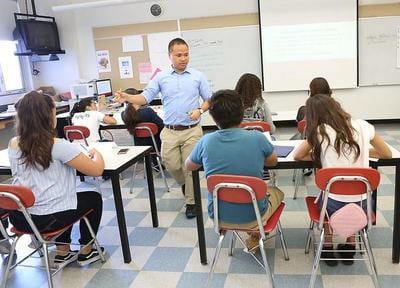
Brief Description
The Secondary Field in Educational Studies offers Harvard College undergraduates an opportunity to examine education from multiple disciplinary perspectives. Students pursuing the secondary field may explore a broad overview including course work related to individual learning, schools as organizations, the role of education in society and educational policy. Alternatively, students may choose to focus in-depth on a particular aspect of education such as social stratification, literacy, childhood and adolescence, or policy.
Concentration Advising Contacts
Julie Reuben, Faculty Director
Charles Warren Professor of the History of American Education
julie_reuben@gse.harvard.edu
Liao Cheng, Assistant Director
Lecturer on Education
Liao_cheng@gse.harvard.edu
Rees Collier, Program Coordinator
rees_collier@gse.harvard.edu
Ethnicity, Migration, Rights**

Brief Overview
The secondary field in Ethnicity, Migration, Rights (EMR) focuses on the closely linked areas of ethnicity, migration, and Indigeneity, with particular attention to Asian American and Pacific Islander, Latinx, Native American and Migration and Border Studies. Questions of rights– including political, legal, cultural, and economic rights – occupy an important position within studies of shifting landscapes of ethnicity, immigration, and Indigenous sovereignty. At EMR, studies of ethnicity, migration, and Indigeneity are understood as inseparable from analyses of race, gender, sexuality, disability, and other axes of difference and power. We strive to make these connections visible in our curriculum and programming, creating spaces for intersectional and interdisciplinary scholarly community. Students can declare a designated track in Latinx Studies or EMR.
Gateway Courses
- Several designated courses serve as “Portal Courses” to the field of EMR. Portal Courses are taught by faculty with expertise in one or more areas across ethnicity, migration, Indigeneity, and human rights. Portal Courses may be taken at any time in pursuit of the secondary field and are wonderful gateways to further study in EMR.
- Portal Courses:
- EMR 1010: Topics in Latinx Studies
- EMR 1020: Topics in Asian American and Pacific Islander Studies
- EMR 131/WGS 1283: Love’s Labors Found: Uncovering Histories of Emotional Labor
- EMR 1030: Topics in Native American & Indigenous Studies
- EMR 1040: Topics in Asian American Studies
- EMR 180: Introduction to Migration and Border Studies
Concentration Advising Contacts
Leslie Fernandez
Program Director
leslie_fernandez@fas.harvard.edu
European History, Politics, and Societies**

Brief Overview
The Secondary Field in European History, Politics, and Societies (EHPS) offers students the opportunity to pursue an interdisciplinary course of study focused on modern Europe, in particular its politics, economics, history, and social and cultural developments.
Learning Objectives
While the EHPS rests mainly on courses from the social science disciplines, it also includes those considering Europe in a comparative context as well as courses covering a specific period or region of Europe. In addition, it provides for a humanistic inquiry of Europe reflecting its diverse cultural and linguistic heritage through a broad array of courses from the humanities departments.
Gateway Courses
Information about courses can be found here: https://ces.fas.harvard.edu/opportunities/undergraduates/secondary-field-in-european-history-politics-and-societies-ehps
Concentration Advising Contacts
Carrie Rosenblum, CES Program Manager
carrie_rosenblum@fas.harvard.edu
Global Health and Health Policy**

Brief Overview
The Secondary Field in Global Health and Health Policy is centered on the interdisciplinary exploration of health care, health policy, and health science. Through a curriculum that encourages experiential learning, the program enables students to explore a wide range of topics ranging from transnational health problems and social determinants to a concentrated focus on social responses, such as health systems and health policies.
Learning Objectives
Upon completion of the secondary field, GHHP students will know how to actively engage with complex themes from a variety of perspectives, conduct health-related research, and critically think about a spectrum of health issues, both domestic and global.
Gateway Courses
GHHP designates a handful of courses as foundational courses. Foundational courses are good gateways to further study in GHHP but may be taken at any time in pursuit of the secondary field:
- GENED 1063: World Health: Challenges and Opportunities
- GENED 1079: Why Is There No Cure for Health Care?
- GENED 1093: Who Lives, Who Dies, Who Cares: Reimagining Global Health
Freshman seminars also offer a path to exploring GHHP. There are many health-related ones that satisfy GHHP distributional requirements.
Concentration Advising Contacts
Ryan Kim
Senior Program Coordinator, GHHP Undergraduate Program
ryan_kim@harvard.edu
Debbie Whitney
Director, Interfaculty Initiative in Health Policy
deborah_whitney@harvard.edu
Government

Brief Overview
The Department of Government—like political science—is an umbrella for a remarkable range of political subjects and approaches to studying them. It stands at the cross-roads of history, law, economics, sociology, philosophy, and ethics, borrowing from these disciplines as well as constructing theories and methods of its own.
Learning Objectives
Our first goal is to make all students aware and critical of their unexamined assumptions about politics. Learning to think independently and with some critical distance, to analyze arguments—theoretical, empirical and rhetorical—to weigh alternatives, to write cogently, and to speak persuasively are essential skills for responsible global citizenship as well as professional careers. To achieve breadth in the discipline of political science is our second aim. Third, we encourage students to chart a distinctive path through political science. We offer each student the possibility of satisfying his or her particular intellectual bent and curiosity through a cluster of electives and at least one required seminar. Finally, we encourage students to produce as well as consume political science research.
Gateway Courses
- GOV 10: Foundations of Political Theory
- GOV 20: Foundations of Comparative Politics
- GOV 30: American Government: A New Perspective
- GOV 40: International Conflict and Cooperation
- GOV 1005: Data
Concentration Advising Contacts
Dr. Nara Dillon*
Director of Undergraduate Studies
ndillon@fas.harvard.edu
Dr. Gabriel Katsh*
Assistant Director of Undergraduate Studies
katsh@fas.harvard.edu
Karen Kaletka**
Manager of Undergraduate Studies
kbkaletka@gov.harvard.edu
*Study Abroad Contact
**Secondary Field Contact
History and Literature

Brief Overview
Harvard’s oldest concentration, History & Literature is an interdisciplinary humanities program where you work closely with outstanding faculty in small-group and one-on-one tutorials. Beyond these tutorials, you take courses from a variety of departments as you develop your individual interests at the intersection of art, history, politics, and culture.
Learning Objectives
History & Literature is an honors concentration that helps you build the skills you need to write a thesis in your senior year. In small-group tutorials, we provide rigorous training in how to read and analyze a diverse array of primary and secondary sources, advise you as you conduct original research, and help you develop interdisciplinary approaches to the exciting material that you discover along the way.
Gateway Courses
- HUM 7 (fall)
- Consider taking one of our HL90 Seminars to experience the kind of work we do in History & Literature. These courses are designed for first-year students and sophomores.
- You may also consider introduction to humanities courses such as HUM 10. Many GenEd courses that meet the Aesthetics & Culture requirement or the Histories, Societies, Individuals requirement also count for concentration credit in History & Literature.
Concentration Advising Contacts
Angela Allan
Associate Director of Studies
allan@fas.harvard.edu
History and Science

Brief Overview
History & Science is an interdisciplinary field of study. The program offers students a variety of opportunities to expand their understanding of the scientific enterprise and to explore in detail how science has developed in history and how science has shaped other human activities. Students are challenged to ask big questions about science, medicine, and technology, and their place in human societies across time. How do scientists come to know things about the natural world? Why should we believe what they tell us? What are some social, ethical, political and religious implications of science? How do they affect the way people in different times and places live their lives?
Learning Objectives
The History & Science concentration has two tracks. The Science and Society track is designed for students who want to combine history of science (and related areas) with training in a particular science area. We also have a special Medicine and Society option for pre-med students, as well as an option for students interested in Mind, Brain, Behavior or Technology, Information, and Society.
The History of Science track offers students the opportunity to take extra courses in history of science and related areas, and does not require any specific science courses. This track allows for more connections to be built to other relevant social science fields, such as sociology, philosophy, anthropology, or government.
Gateway Courses
- History of Science 100: Knowing the World: An Introduction to the History of Science (fall)
- HISTSCI 1445: Medicine and Health in America
- HISTSCI 101: Making the World: An Introduction to the History of Technology
- HISTSCI 1955: Science in Popular Culture
- General Education 1089: The Border: Race, Politics, and Health in Modern Mexico
- General Education 1116: Medical Ethics and History
- General Education 1127: Gender and Science
- General Education 1143: Dark Satanic Mills: How the Factory Made Our World
- General Education 1174. Life and Death In the Anthropocene
Concentration Advising Contacts
Anne Harrington
Director of Undergraduate Studies
aharring@fas.harvard.edu
(617) 496-5234
Alice Belser (Study Abroad Contact)
Manager of Student Programs, Concentration Advisor, Secondary Fields Contact
ajbelser@fas.harvard.edu
617-495-3742
Linguistics

Brief Overview
Linguists are engaged in the study of language structure, which is the ultimate interdisciplinary enterprise. Linguistic theory attempts to model a complex domain of human knowledge that is also central to philosophy of mind and to cognitive psychology. The linguistic models that theoretical linguists construct are formal in character and rely on computational and mathematical methodologies. As such, linguistics has a mutually beneficial relationship with computer science and the study of artificial intelligence.
Learning Objectives
An undergraduate degree in linguistics will give you insight into one of the most fascinating aspects of human knowledge and behavior. As a linguistics major, you will learn about many aspects of human language, including sounds (phonetics, phonology), words (morphology), sentences (syntax), and meanings (semantics).
In exploring these and similar topics, students of linguistics not only learn a great deal about a fascinating field; they also master a variety of conceptual and empirical techniques that stand them in good stead after graduation.
Gateway Courses
For a broad introduction of Linguistics:
- Ling 83: Language, Structure, and Cognition
- Ling 101: The Science of Language
- Ling 107: Introduction to Indo-European (for those interested in historical linguistics)
- Any freshman seminar in Linguistics
- LING 10: Language
Highly suggested for those interested in historical linguistics:
- Ling 107: Introduction to Indo-European
Concentration Advising Contacts
Kathryn Davidson
Director of Undergraduate Studies
kathryndavidson@fas.harvard.edu
Helen Lewis
Graduate and Undergraduate Student Program Coordinator
hlewis2@fas.harvard.edu
617-495-4054
TBD*, Assistant Head Tutor
Medieval Studies**

Brief Overview
The Committee on Medieval Studies is an interdisciplinary group of faculty who teach and study a thousand-year-long period of European, Near Eastern, and North African history and culture spanning the period between “Antiquity” (c. 1000 BCE -500 CE) and “Modernity” (c. 1500 CE onward), one that profoundly shaped Western as well as global society as we know it today. While learning about the vast and varied period known as the Middle Ages offers a unique and valuable perspective on modern history and culture, it also teaches us how people who are so much like us in so many ways also lived in a world that was completely different from our own. The Middle Ages is both “us” and “not us,” at once part of our collective heritage and something very, very different.
Learning Objectives
To discover the fascinating ways that human societies very different from our own functioned, invented, created, believed, and interacted with one another.
Gateway Courses
- Medieval Studies 250: At Cross Purposes: The Crusades in Material Culture
- History 1935: Byzantine Civilization
- History and Literature 90an: God Save the Queen! Ruling Women from Rome to the Renaissance
- HAA 12m: Monuments of Islamic Architecture
- HAA 42p: Architecture through the Ages: Notre-Dame de Paris
- Italian 138: The Cosmos of the Divine Comedy
Concentration Advising Contacts
Nicholas Watson
Chair of the Committee on Medieval Studies
nwatson@fas.harvard.edu
617-495-0969
Sean Gilsdorf
Director of Undergraduate Studies
gilsdorf@fas.harvard.edu
617-496-5857
Philosophy
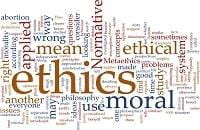
Brief Overview
Philosophy studies many of humanity’s fundamental questions: how should we live, what kind of society should we strive towards, what are the limits of human knowledge? What is truth? Justice? Beauty? These questions are central to our lives, because in much of what we do, we at least implicitly assume answers to them. Philosophy seeks to reflect on these questions and answer them in a systematic, explicit, and rigorous way—relying on careful argumentation, and drawing from outside fields as diverse as economics, literature, religion, law, mathematics, the physical sciences, and psychology. And while most of the tradition of philosophy is Western, we seek to connect with non-Western traditions like Islam and Buddhism, as well.
Learning Objectives
Students develop their own responses to the philosophical problems that attract them in conjunction with their study of philosophical writing. The department’s introductory courses help students to develop their reading, writing, and reasoning skills while acquainting them with broad surveys of major areas and historical periods. The department’s more advanced courses focus on more specific topics and allow students to explore their interests in the context of the broad foundation they acquired in the introductory courses. The skills that philosophy teaches students will always be in high demand: the ability to think and write clearly, the ability to bring to light unnoticed presuppositions, to explain complex ideas clearly, to tease out connections and implications, to see things in a broader context, to challenge orthodoxy.
Gateway Courses
Fall:
- GENED 1046 Race and Social Justice
- FRSEM 23c Exploring the Infinite
- FRSEM 30q Death and Immortality
- FRSEM 56F The Good, the Bad, and the Beautiful: The Ethics of Art
- PHIL 3 The True and The Good (not offered 2024-2025)
- PHIL 4: Logic I
- PHIL 6 Ancient Ethics and Modern Morality
- PHIL 7: Introduction to Ancient Greek and Roman Philosophy
- PHIL 27 Truth, Lies, and the Press
- PHIL 34 Existentialism in Literature and Film
Spring:
- GENED 1025 Happiness
- FRSEM 63x Happiness and Different Ways of Life
- PHIL 8 Self and World: An Introduction to Early Modern Philosophy
- PHIL 9: Empiricists, Scientists, and Charlatans: An Introduction to the Philosophy of Science
- PHIL 11 Philosophy of Law
- PHIL 18 Human Ethics: A Brief History
Concentration Advising Contacts
Ned Hall, Director of Undergraduate Studies/Head Tutor
ehall@fas.harvard.edu
Emily Ware, Department Administrator
eware@fas.harvard.edu
Michael Ricca, Undergraduate Program Coordinator
michael_ricca@harvard.edu
Social Studies

Brief Overview
Social Studies was founded in 1960 by a distinguished group of faculty who believed that the study of the social world requires an integration of the disciplines of history, political science, economics, sociology, and anthropology. For over five decades, Social Studies has brought together outstanding teachers and intellectually engaged students who share a fascination with social science research and theory and a deep interest in applying social science to contemporary social, economic, and political problems.
Learning Objectives
Social Studies students develop excellent analytical, research, and writing skills, and they devote their senior year to writing a thesis, which serves both as a capstone to their undergraduate education and a chance to develop and complete a major independent project. We expect our students to engage with a range of ideas and opinions in the classroom and to explore their own values and beliefs in relation to empirical evidence and in relation to the values and beliefs of others.
Gateway Courses
- EC10a or EC10b (fall or spring)
- ECON 50: Using Big Data to Solve Economic and Social Problems (spring)
- First Year students considering Social Studies may want to take Economics 10, 50, or any upper level course for which Economics 10 is recommended preparation.
- Students may want to take a course in Ethics and Civics or a philosophy course to determine whether they enjoy social theory.
- Students should take social science courses in areas that interest them. For example, a student who is interested in development in East Asia should take a course on that region to learn more about the history, economics, or politics of at least one of the countries in that area of the world. A student who is interested in poverty in the United States should take a course on a related topic, such as a sociology course on urban poverty or a course on social problems in the American economy.
Concentration Advising Contacts
Chris Rominger
Director of Undergraduate Studies
crominger@fas.harvard.edu
617-496-1838
Rosemarie Wagner
Associate Director of Studies (First-Years and Sophomores)
rosemarie_wagner@fas.harvard.edu
617-496-1750
Kate Anable
Undergraduate Program Administrator
keanable@fas.harvard.edu
617-495-2188
Charles Clavey (Study Abroad Contact)
Associate Director of Studies (Juniors and Seniors)
cclavey@fas.harvard.edu
617-496-5178
Sociology

Brief Overview
Sociology is the study of society, of the social frameworks within which we live our lives. It is a study of social life at every level, from two-person relationships to the rise and fall of nations and civilizations.
Sociology is excellent training for careers in law and public administration, medicine and public health, advertising and marketing, politics and public policy, business, banking, and consulting.
Learning Objectives
We prepare students to develop sociological questions and to design and conduct systematic and rigorous research. Hands-on experiences are integrated into sociology electives, advanced methods courses, senior theses, and faculty RA opportunities. Because studying social processes requires a broad range of approaches, we offer instruction in statistical modeling, in-depth interviewing, ethnographic observations, archival investigations, and computational analyses. Concentrators select from a range of topical and methodological electives. Those interested in emphasizing methodological training can select the Data Analytics track.
Gateway Courses
These courses are designed to give you an introduction to the discipline:
- SOCIOL 1000: Introduction to Sociology
- SOCIOL 1024: Social Inequality
- SOCIOL 1023: Political Sociology
- SOCIOL 1046: Life and Death by Design (not offered 2024-2025)
- SOCIOL 1058: Sex, Gender, and Sexuality
- SOCIOL 1129: Sociology of Education
- SOCIOL 1182: Law and Society
- SOCIOL 1197: Poverty in the United States
- SOCIOL 1025: Sociology of Organizations
- SOCIOL 1146: Sociology of Health and Medicine
These Gen Ed courses also introduce you to a sociological approach and count as a sociology concentration elective:
- Gen Ed 1019: The Caribbean Crucible
- Gen Ed 1092: American Society and Public Policy
- Gen Ed 1115: Human Trafficking, Slavery and Abolition in the Modern World
- GenEd 1192: Philanthropy, Nonprofits, and the Social Good
Many students discover Sociology by starting with an elective course. You can take any 1100-level or 1200-level course on a topic that interests you. Find our offerings here: https://sociology.fas.harvard.edu/pages/undergraduate
If you have confidence that you are going to concentrate in sociology you might consider taking one of the following core courses that are required for concentrators.
- SOCIOL 97: Social Theory (offered fall and spring)
- SOCIOL 1128: Models of Social Science Research (offered spring only)
Concentration Advising Contacts
Emily Fairchild
Associate Director of Undergraduate Studies
efairchild@fas.harvard.edu
617-495-8769
Rebecca Russell
Undergraduate Advising Program Administrator
rrussell@fas.harvard.edu
617-495-3713
Studies of Women, Gender, and Sexuality (WGS)

Brief Overview
The concentration in Studies of Women, Gender, and Sexuality (WGS) brings together a wide range of academic fields in the humanities, social sciences, and sciences (including history, literature, visual studies, anthropology, sociology, ethnic studies, political science, psychology, and biology, to name just a few). As an interdisciplinary field of study, WGS pays close attention to how social norms have changed over time and how they vary across cultures. The concentration also actively investigates the ways in which ideas about gender and sexuality have shaped public policy, civil rights, health care, religion, education and the law, as well as the depiction of women and men in art, literature, and the popular media. WGS courses are characterized by a strong commitment to critical thinking, as well as a spirit of open and sustained intellectual inquiry.
Learning Objectives
WGS provides students with a rigorous grounding in the theory and methodology of gender and sexuality studies, helping students hone their skills in critical analysis, close reading, and effective research and writing.
Undergraduate Peer Advisers? https://wgs.fas.harvard.edu/people/people-terms/peer-advisers
WGS Peer Advisers are current concentrators who provide advice and guidance to prospective and new concentrators and who help promote concentration events and programming. If you are a current or prospective student considering WGS, Peer Advisers are happy to discuss their experience in the concentration.
Gateway Courses
FALL 2024
- WOMGEN 97: Dreams of a Common Language
- WOMGEN 1208: Gender & Sexuality in Korean Pop Culture
- WOMGEN 1209: Dangerous Words
- WOMGEN 1216: Women’s Voices in Asian and Asian-American Literature
- WOMGEN 1200WH: Making and Unmaking Women in African History
- WOMGEN 1127: “Beyond the Sound Bite” (Jardine)
SPRING 2025
- GENED 1127: “Gender and Science” (Richardson)
- GENED ##: “LGBT Lives” (Schlossberg)
- GENED 1130: Power to the People: Black Power, Radical Feminism, and Gay Liberation
- WOMGEN 97: “Sophomore Tutorial” (Bronski)
- WOMGEN 1225: “Leaning In, Hooking Up: Visions of Feminism and Femininity in the 21st Century” (Thompson)
- WOMGEN 1274: “Gender, Race, and Poverty in the United States” (Mtshali)
Concentration Advising Contacts
Robert F. Reid-Pharr
Chair of Studies of Women, Gender, and Sexuality
rpharr@fas.harvard.edu
Caroline Light (Study Abroad Contact)
Director of Undergraduate Studies, Secondary Field Contact
clight@fas.harvard.edu
617-495-1964
Linda Schlossberg
Associate Director of Undergraduate Studies, Secondary Field Contact
schloss@fas.harvard.edu
617-495-3855
Amy Parker
Department Administrator
aparker@fas.harvard.edu
617-495-9199
Quantitative Social Sciences
Applied Math

Brief Description
Applied mathematics represents a quantitative liberal arts degree. The degree provides the opportunity for combining mathematical thinking with any subject for which mathematics can be productively applied.
In some instances, combining applied mathematics with a particular subject can lead to a program of study that is quite similar to studying that subject itself. For example, applied mathematics with physics as an application area is quite similar to studying physics. On the other hand, there are other instances (combining applied mathematics with psychology or government) where the degree program would be quite different.
Learning Objectives
For concentrators, a core learning objective is building and demonstrating foundational knowledge in computation, probability, discrete, and continuous mathematics. This happens through the successful completion of the foundation and breadth courses. In addition, through their coursework, concentrators should gain facility and comfort in using approximation to simplify problems and gain insight. They should learn to communicate effectively with fellow technical professionals and should be prepared, by their senior year, to tackle mathematical modeling problems in their area of application, at the level of a senior thesis.
Gateway Courses
- Math Ma and Mb or 1a
- Math 1b
- APMTH 10: Computing with Python for Scientists and Engineers
- APMTH 50
- Math 21a/Math 21b
- Math 22a/Math 22b
- APMTH22a/APMTH22b
Concentration Advising Contacts
Professor Zhiming Kuang (Fall 2024)
Professor Eli Tziperman (Spring 2025)
Co-Director of Undergraduate Studies
Dr. Margo Levine (Study Abroad Contact)
Co-Director of Undergraduate Studies
am-advising@seas.harvard.edu
617-496-8129
Dr. Sarah Iams
Co-Director of Undergraduate Studies
am-advising@seas.harvard.edu
617-495-5935
Economics
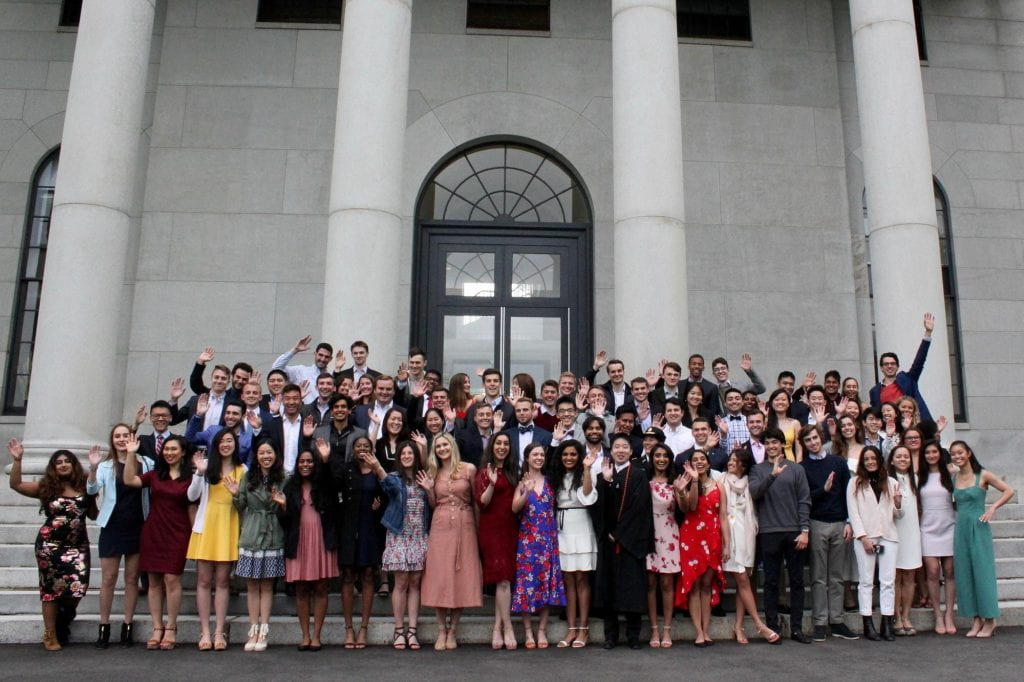
Brief Description
Economics is a social science that covers broad subject matter in seeking to understand the social world. An economic analysis begins from the premise that individuals have goals and that they pursue those goals as best they can. Economics studies the behavior of social systems—such as markets, corporations, legislatures, and families—as the outcome of interactions through institutions between goal-directed individuals. Ultimately, economists make recommendations that they believe will make people better off.
Learning Objectives
The Harvard Economics Department aims to teach undergraduate students the basic principles of economics, to introduce them to various subfields within economics, and to give them a foundation in understanding and carrying out economics research.
Gateway Courses
- ECON 10a (fall, spring) and 10b (fall, spring), Principles of Economics. Open to all students, no pre-requisites. Students interested in economics are encouraged to take Ec 10 during freshman year. (Students with appropriate AP or IB scores in economics may skip the relevant semester of Ec 10ab, but each skipped semester of Ec 10 must be replaced with an economics elective. See website or an ec advisor for details.)
- MATH 1a (or equivalent) (fall). Required of all concentrators and necessary for the Econ 1010/1011 courses and many higher level ec electives. (Students who placed out of Math 1a on the Harvard math placement test or who earned a 5 on AP Calculus AB or BC are deemed to have fulfilled this requirement.)
- One of STAT 100, STAT 104, STAT 109, STAT 110, AM 101, MATH 154 or ECON 20. (spring) Concentrators need a basic understanding of statistics before proceeding into the Econ 970 Sophomore Tutorial and Econ 1123/1126 econometrics courses.
- ECON 1010a (fall, spring) or ECON 1011a (fall), Intermediate Microeconomics. Introduces students to higher-level microeconomic theory, preparing them for more advanced ec electives and applications of economics.
- ECON 1010b (fall, spring) or ECON 1011b (spring), Intermediate Macroeconomics. Introduces students to higher-level macroeconomic theory, preparing them for more advanced ec electives and applications of economics.
- ECON 1123 (fall, spring) or ECON 1126 (varies), Econometrics. Gives students the necessary tools to understand and undertake empirical economics research.
- ECON 970 (fall, spring), Sophomore Tutorial (can be taken as a junior). A transformative course for ec concentrators! Students learn how to apply key economic principles to a particular field of economics and learn how to read, critique, and carryout economics research.
- ECON 50, Using Big Data to Solve Social Problems. Gives students an introduction to frontier research in applied economics and social science that does not require prior coursework in Economics.
Contact Us:
Jeffrey Miron (Study Abroad Contact)
Director of Undergraduate Studies
miron@fas.harvard.edu
617-495-4129
Justine Johnson
Undergraduate Program Coordinator
econundergrad@fas.harvard.edu
617-495-3247
Kiran Gajwani (Study Abroad Contact)
Associate Director of Undergraduate Advising
kgajwani@fas.harvard.edu
617-495-3948
Energy and the Environment**

Brief Description
The energy-environment challenge is a defining issue of our time, and one of Harvard’s greatest contributions to meeting that challenge will be the education of a new generation of leaders in science, business, law, design, and public service. To this end, the Environmental Science and Public Policy (ESPP) program, in coordination with the Harvard University Center for the Environment (HUCE), is pleased to offer the secondary field in Energy and Environment (E&E). Through coursework and a colloquium, students engaged in the E&E secondary field will increase their exposure to, and literacy in, the interdisciplinary nature of issues related to energy and the environment.
Learning Objectives
All participating students share exposure to the core issues related to climate change, the consequences of energy choices, and changes in our physical and biological environment, preparing them to make informed professional and personal decisions about some of the most pressing societal challenges of the 21st century.
Gateway Courses
Introductory Courses (one required):
EPS 50: The Fluid Earth: Oceans, Atmosphere, Climate, and Environment (spring)
E-PSCI 6: Introduction to Environmental Science and Engineering (fall; concurrent or pre-req Math 1B)
GE 1158: Water and the Environment (spring)
[ GE 1094: The Climate-Energy Challenge ]
[ GE 1085: Energy Resources and the Environment ]
Concentration Advising Contacts
Professor Paul Moorcroft (Fall)
Professor Stephen Ansolabehere (Spring)
Head Tutor
espp@fas.harvard.edu
617-496-6995
Lorraine Maffeo
Program Administrator and Student Services Officer
maffeo@fas.harvard.edu
Environmental Science and Public Policy

Brief Overview
The concentration in Environmental Science and Public Policy (ESPP) is designed to provide a multidisciplinary introduction to current problems of the environment. It is founded on the premise that the ability to form rational judgments concerning many of the complex challenges confronting society today involving the environment requires both an understanding of the underlying scientific and technical issues and an appreciation for the relevant economic, political, legal, historical, and ethical dimensions. Depending on preparation, students may be encouraged to substitute more advanced courses for these requirements. In consultation with their concentration advisor, Through their field of specialization, students develop expertise in a particular field of study relating to the environment.
Learning Objectives
All students satisfy a core of requirements in the physical, biological, and social sciences and mathematics. Students also develop an individual plan of study for a series of advanced courses around a particular field of specialization. Through their field of specialization, students develop expertise in a particular field of study relating to the environment.
Gateway Courses:
Introductory Courses (one required):
EPS 50: The Fluid Earth: Oceans, Atmosphere, Climate, and Environment (spring)
E-PSCI 6: Introduction to Environmental Science and Engineering (fall; concurrent or pre-req Math 1B)
GE 1158: Water and the Environment (spring)
[ GE 1094: The Climate-Energy Challenge ]
[ GE 1085: Energy Resources and the Environment ]
Concentration Advising Contacts:
Professor Paul Moorcroft (Fall)
Professor Stephen Ansolabehere (Spring)
Head Tutor
espp@fas.harvard.edu
617-496-6995
Lorraine Maffeo
Undergraduate Program Administrator and Student Services Officer
maffeo@fas.harvard.edu
617-496-6995
Government

Brief Overview
The Department of Government—like political science—is an umbrella for a remarkable range of political subjects and approaches to studying them. It stands at the cross-roads of history, law, economics, sociology, philosophy, and ethics, borrowing from these disciplines as well as constructing theories and methods of its own.
Learning Objectives
Our first goal is to make all students aware and critical of their unexamined assumptions about politics. Learning to think independently and with some critical distance, to analyze arguments—theoretical, empirical and rhetorical—to weigh alternatives, to write cogently, and to speak persuasively are essential skills for responsible global citizenship as well as professional careers. To achieve breadth in the discipline of political science is our second aim. Third, we encourage students to chart a distinctive path through political science. We offer each student the possibility of satisfying his or her particular intellectual bent and curiosity through a cluster of electives and at least one required seminar. Finally, we encourage students to produce as well as consume political science research.
Gateway Courses
- GOV 10: Foundations of Political Theory
- GOV 20: Foundations of Comparative Politics
- GOV 30: American Government: A New Perspective
- GOV 40: International Conflict and Cooperation
- GOV 1005: Data
Concentration Advising Contacts
Dr. Nara Dillon*
Director of Undergraduate Studies
ndillon@fas.harvard.edu
Dr. Gabriel Katsh*
Assistant Director of Undergraduate Studies
katsh@fas.harvard.edu
Karen Kaletka**
Manager of Undergraduate Studies
kbkaletka@gov.harvard.edu
*Study Abroad Contact
**Secondary Field Contact
Psychology

Brief Overview
Psychology is the scientific study of the mind, and as such, we investigate the minds of humans and other species. We try to understand the mind at many different levels of analysis, from taking measurements from the brain, through learning about the individual, all the way to understanding groups and organizations. Most of the research conducted in Harvard’s Department of Psychology concerns basic psychological processes such as attention, perception, memory, categorization, reasoning, decision-making, language, cognitive and social development, social cognition, intergroup relations, and morality. In addition, some members of the department conduct research on the etiology, development, and treatment of psychopathology. All members of the department share the common goal of understanding mind, brain, and behavior through empirical investigation, and their teaching and research reflect this goal.
Learning Objectives
The primary goal of the Psychology concentration is to provide students with a fundamental understanding of the human mind. In the process of doing so, other goals will also be achieved: the skill to critically assess quantitative evidence from experimental and correlational data, to learn to take difficult and previously unstudied problems of mind and society and bring them under experimental scrutiny, to learn to speak and write about questions of great theoretical and social importance that involve the mind.
Gateway Courses
Psychology requires course completion in the following order:
First, take:
- PSY 1: Introduction to Psychological Science (formerly SLS 20, offered fall and spring) is a prerequisite for the majority of psychology courses and required for the concentration or secondary field. You may be able to count a Psychology AP score of 5 or IB score of 7 towards the Introductory course requirement. Please contact the Psychology Undergraduate Office at psychology@wjh.harvard.edu to learn more.
- PSY 1900: Introduction to Statistics for the Behavioral Sciences (offered fall and spring) is required by the end of sophomore year. It can be taken prior to or concurrently with PSY 1.
Then, take two of the following Foundational Courses (see track-specific requirements).
- Psychology 11: Cognition: How the Mind Works
- Psychology 14: Cognitive Neuroscience
- Psychology 15: Social Psychology
- Psychology 16: Developmental Psychology
- Psychology 18: Psychopathology
Concentration Advising Contacts
Send general inquiries to psychology@wjh.harvard.edu
Katie Powers (Study Abroad Contact)
Associate Director of Undergraduate Studies
Jill Hooley
Director of Undergraduate Studies
jmh@wjh.harvard.edu
Correna Cohen
Undergraduate Program Coordinator
correna_cohen@fas.harvard.edu
Sociology

Brief Overview
Sociology is the study of society, of the social frameworks within which we live our lives. It is a study of social life at every level, from two-person relationships to the rise and fall of nations and civilizations.
Sociology is excellent training for careers in law and public administration, medicine and public health, advertising and marketing, politics and public policy, business, banking, and consulting.
Learning Objectives
We prepare students to develop sociological questions and to design and conduct systematic and rigorous research. Hands-on experiences are integrated into sociology electives, advanced methods courses, senior theses, and faculty RA opportunities. Because studying social processes requires a broad range of approaches, we offer instruction in statistical modeling, in-depth interviewing, ethnographic observations, archival investigations, and computational analyses. Concentrators select from a range of topical and methodological electives. Those interested in emphasizing methodological training can select the Data Analytics track.
Gateway Courses
These courses are designed to give you an introduction to the discipline:
- SOCIOL 1000: Introduction to Sociology
- SOCIOL 1024: Social Inequality
- SOCIOL 1023: Political Sociology
- SOCIOL 1046: Life and Death by Design (not offered 2024-2025)
- SOCIOL 1058: Sex, Gender, and Sexuality
- SOCIOL 1129: Sociology of Education
- SOCIOL 1182: Law and Society
- SOCIOL 1197: Poverty in the United States
- SOCIOL 1025: Sociology of Organizations
- SOCIOL 1146: Sociology of Health and Medicine
These Gen Ed courses also introduce you to a sociological approach and count as a sociology concentration elective:
- Gen Ed 1019: The Caribbean Crucible
- Gen Ed 1092: American Society and Public Policy
- Gen Ed 1115: Human Trafficking, Slavery and Abolition in the Modern World
- GenEd 1192: Philanthropy, Nonprofits, and the Social Good
Many students discover Sociology by starting with an elective course. You can take any 1100-level or 1200-level course on a topic that interests you. Find our offerings here: https://sociology.fas.harvard.edu/pages/undergraduate
If you have confidence that you are going to concentrate in sociology you might consider taking one of the following core courses that are required for concentrators.
- SOCIOL 97: Social Theory (offered fall and spring)
- SOCIOL 1128: Models of Social Science Research (offered spring only)
Concentration Advising Contacts
Emily Fairchild
Associate Director of Undergraduate Studies
efairchild@fas.harvard.edu
617-495-8769
Rebecca Russell
Undergraduate Advising Program Administrator
rrussell@fas.harvard.edu
617-495-3713
Statistics

Brief Overview
Statistics is a relatively young discipline, organized around the rapidly growing body of knowledge about principled methods for data collection and data analysis, the making of rational decisions under uncertainty, and the modeling of randomness in any quantitative inquiries, including the social, natural, and medical sciences. Statistics has a theoretical core surrounded by a large number of domains of application in fields such as anthropology, astronomy, biology, business, chemistry, computer science, economics, education, engineering, environmental sciences, epidemiology, finance, forensic science, geophysical sciences, government, history, law, linguistics, mathematics, medicine, physics, population science, psychology, sociology, and many others.
Learning Objectives
A basic goal of the concentration in Statistics is to help students acquire the conceptual, computational, and mathematical tools for quantifying uncertainty and making sense of complex data arising from many applications.
Gateway Courses
- Statistics 100: Introduction to Statistics and Data Science (fall and spring)
- Statistics 102: Introduction to Statistics for Life Sciences (spring)
- Statistics 104: Introduction to Quantitative Methods for Economics (fall and spring)
- Only one of Stat 100, 102, or 104 can be taken for credit
- Statistics 110: Introduction to Probability (fall)
- Statistics 111: Introduction to Theoretical Statistics (spring)
- Statistics 139: Statistical Sleuthing Through Linear Models (fall)
It is highly recommended to take Stat 110, 111, and 139 sequentially and in numerical order.
Concentration Advising Contacts
Joseph Blitzstein (Study Abroad Contact)
co-Director of Undergraduate Studies
blitz@fas.harvard.edu
617-496-2985
Kelly McConville
co-Director of Undergraduate Studies
kmcconville@fas.harvard.edu
617-496-1824
https://statistics.fas.harvard.edu/people/kelly-mcconville
Kevin Rader
Associate Director of Undergraduate Studies
krader@fas.harvard.edu
617-495-5204
Kathleen Cloutier
Student Programs Administrator
cloutier@fas.harvard.edu
617-496-1402
Lorna Blocksma
lblocksma@fas.harvard.edu

For First-Years: Exploration
The Exploring Fields of Study program takes place every Spring semester and provides first-year students the opportunity to attend events hosted by concentrations and secondaries, where they can hear from and speak with faculty, advisors, and peers about the nuances of the department and determine whether it is the right fit for them.
For Sophomores: Declaration
Concentration declaration takes place in the Fall semester of students’ sophomore year. In advance of concentration declaration, sophomores should:
- Contact Directors of Undergraduate Studies or concentration advisors with any questions or set up a time to meet with them.
- Review the official requirements for your prospective concentration in the Fields of Concentration handbook.
- Consult our Guide to Pre-Declaration Processes to ensure you complete all the necessary steps to declare your concentration on time.
- Follow the steps to declare your concentration in my.harvard by the declaration deadline.

Academic Planning Resources
Academic planning also involves introspection, goal-setting, and the careful selection of courses, activities, and co-curricular opportunities. To inform your own academic planning, we encourage you to learn more about these academic requirements and opportunities by reviewing the pages below.

